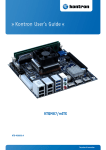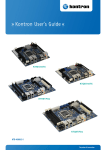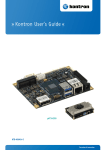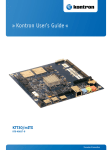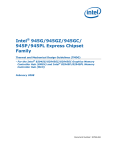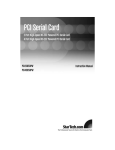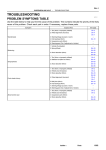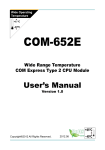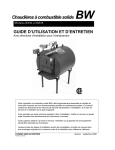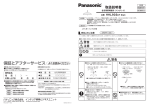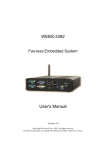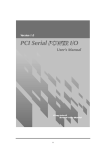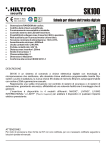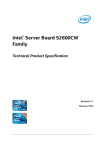Download Kontron User's Guide
Transcript
mITX-E38 (Thin Mini-ITX size) KTD-N0903-C The pulse of innovation Error! Use the Home tab to apply Überschrift 1 to the text that you want to appear here. Table of Contents » Table of Contents « 1 Introduction ........................................................................................... 5 2 Installation Procedure .............................................................................. 6 2.1 Installing the Board ................................................................................................................ 6 2.2 Requirements IEC60950 ........................................................................................................... 7 3 System Specifications ............................................................................... 8 3.1 Component main data .............................................................................................................. 8 3.2 System overview .................................................................................................................... 11 3.3 Integrated Premounted Cooler .................................................................................................. 12 3.4 System Memory Support .......................................................................................................... 12 3.5 Power Consumption................................................................................................................ 13 4 Connector Locations ............................................................................... 14 4.1 mITX-E38 – Frontside and Rear IO .............................................................................................. 14 5 Connector Definitions ............................................................................. 15 6 Rear IO Connectors ................................................................................. 16 6.1 DC Power Jack Connector (Ext12V – J35) ..................................................................................... 16 6.2 DP Connectors (DP1 – J24, DP2 – J22) ........................................................................................ 17 6.3 USB Connectors (IO Area) ........................................................................................................ 18 USB Connector 1/2 (USB1 / USB2 – J6) ........................................................................................................ 19 USB Connector 3 (USB3 – J20) .................................................................................................................... 19 6.4 Ethernet Connectors (LAN1 – J4 and LAN2 – J5) ........................................................................... 20 6.5 Audio Jack Connectors (Speakers – J2, Line-In –J23) .................................................................... 21 7 Internal Connectors ................................................................................ 22 7.1 DC Power Internal Connector (Int12V – J7) .................................................................................. 22 7.2 Power Out Connector (PowerOut - J32) ....................................................................................... 23 7.3 Internal Audio Connectors ....................................................................................................... 24 Headphone Connector (Headphone – J34) .................................................................................................... 24 Mic Connector (MIC – J17).......................................................................................................................... 24 SPDIF Connector (SPDIFout – J33) ............................................................................................................... 24 7.4 Fan for SOC and System (Fan SOC – J29, Fan Sys – J28) .................................................................. 25 7.5 PS/2 Keyboard and Mouse connector (KBD/MSE) (J26) .................................................................. 26 7.6 LVDS Flat Panel Connector (LVDS – J31) ...................................................................................... 27 7.7 SATA (Serial ATA) Disk interface (SATA0 – J15, SATA1 – J1) ............................................................. 28 7.8 Internal USB Connectors (USB6/7 – J21) .................................................................................... 29 7.9 Serial COM Ports (COM1-6, J19, J18, J37, J38, J10, J9) .................................................................. 30 7.10 Front Panel Connector (FRONTPNL - J12) ..................................................................................... 31 7.11 Feature Connector (Feature – J27)............................................................................................. 32 7.12 Clear CMOS Settings” (Clear CMOS – J3) ...................................................................................... 34 7.13 Users Guide Always On connector (Always On -KTQM87/mITX J36) ....................................................................................... 35 mITX-E38 Users Guide Error! Use the Home tab to apply Überschrift 1 to the text that you want to appear here. Table of Contents 7.14 SPI Connector (SPI – J16) ........................................................................................................ 36 7.15 LPC Connector (LPC - J30) ........................................................................................................ 37 7.16 XDP Debug Port (XDP – J40) ..................................................................................................... 38 8 Slot Connectors ..................................................................................... 39 8.1 PCI-Express x1 Connector (PCIex1 – J8) ...................................................................................... 39 8.2 SD card slot (SD Card – J25) ..................................................................................................... 39 8.3 mPCIe/mSATA connector (mPCIe or mSATA & USB – J13) ................................................................ 40 9 Onboard - & mating connector types .......................................................... 41 10 BIOS .................................................................................................... 42 10.1 Main ................................................................................................................................... 42 System Information .................................................................................................................................. 43 Boot Features .......................................................................................................................................... 44 Error Manager .......................................................................................................................................... 46 10.2 Advanced ............................................................................................................................. 47 CPU Configuration .................................................................................................................................... 48 Uncore Configuration ................................................................................................................................ 50 LAN Configuration .................................................................................................................................... 52 Hardware Health Configuration ................................................................................................................... 53 Kontron Configuration............................................................................................................................... 55 Display Configuration ................................................................................................................................ 56 System Components .................................................................................................................................. 57 South Cluster Configuration........................................................................................................................ 58 USB Configuration .................................................................................................................................... 60 Audio Configuration .................................................................................................................................. 61 SATA Drives ............................................................................................................................................. 62 LPSS & SCC Configuration ........................................................................................................................... 63 Miscellaneous Configuration ....................................................................................................................... 65 10.3 Security Configuration ............................................................................................................ 66 Thermal .................................................................................................................................................. 67 SMBIOS Event Log .................................................................................................................................... 70 Memory ECC Error Logging .......................................................................................................................... 71 10.4 Security ............................................................................................................................... 72 10.5 Boot ................................................................................................................................... 73 10.6 Exit..................................................................................................................................... 74 KTQM87/mITX Users Guide mITX-E38 Users Guide KTD-N0903-C Page 2 Document Details Document Revision History Revision Date By Comment C January 27th 2015 MLA USB0 and USB3 swapped. Doc header in BIOS part corrected. “Flex” info removed. Minor corrections. Added board PN to introduction table. Fan Thermal Cruise corrected to Speed Cruise. ITE8517 corrected to IT8768E. “Thin Mini-ITX size” has been added. Corrected LPC (J30) description. Added System Memory Support. EXT_BAT max. 3.47 V. Added IO Bracket info and warning changing cooling system. BIOS part added. th B January 26 2015 MLA A August 21st 2014 MLA 0 April 4th 2014 MLA Added Cooler info. Improved DC power jack description. Updates. Mating connectors. Preliminary version Copyright Notice Copyright 2013, KONTRON Technology A/S, ALL RIGHTS RESERVED. No part of this document may be reproduced or transmitted in any form or by any means, electronically or mechanically, for any purpose without the express written permission of KONTRON Technology A/S. Trademark Acknowledgement Brand and product names are trademarks or registered trademarks of their respective owners. Disclaimer KONTRON Technology A/S reserves the right to make changes without notice to any product, including circuits and/or software described or contained in this manual in order to improve design and/or performance. Specifications listed in this manual are subject to change without notice. KONTRON Technology assumes no responsibility or liability for the use of the described product(s), conveys no license or title under any patent, copyright or mask work rights to these products and makes no representations or warranties that these products are free from patent, copyright or mask work right infringement unless otherwise specified. Applications that are described in this manual are for illustration purposes only. KONTRON Technology A/S makes no representation or warranty that such application will be suitable for the specified use without further testing or modification. mITX-E38 Users Guide KTD-N0903-C Page 3 Document Details Life Support Policy KONTRON Technology’s PRODUCTS ARE NOT FOR USE AS CRITICAL COMPONENTS IN LIFE SUPPORT DEVICES OR SYSTEMS WITHOUT EXPRESS WRITTEN APPROVAL OF THE GENERAL MANAGER OF KONTRON Technology A/S. As used herein: Life support devices or systems are devices or systems which (a) are intended for surgical implant into body or (b) support or sustain life and whose failure to perform when properly used in accordance with instructions for use provided in the labelling can be reasonably expected to result in significant injury to the user. A critical component is any component of a life support device or system whose failure to perform can be reasonably expected to cause the failure of the life support device or system or to affect its safety or effectiveness. Warranty KONTRON Technology warrants its products to be free from defects in material and workmanship during the warranty period. If a product proves to be defective in material or workmanship during the warranty period KONTRON Technology will, at its sole option, repair or replace the product with a similar product. Replacement Product or parts may include remanufactured or refurbished parts or components. The warranty does not cover: 1. Damage, deterioration or malfunction resulting from: A. Accident, misuse, neglect, fire, water, lightning or other acts of nature, unauthorized product modification or failure to follow instructions supplied with the product. B. Repair or attempted repair by anyone not authorized by KONTRON Technology. C. Causes external to the product, such as electric power fluctuations or failure. D. Normal wear and tear. E. Any other causes which does not relate to a product defect. 2. Removal, installation and set-up service charges. Exclusion of damages: KONTRON TECHNOLOGY LIABILITY IS LIMITED TO THE COST OF REPAIR OR REPLACEMENT OF THE PRODUCT. KONTRON TECHNOLOGY SHALL NOT BE LIABLE FOR: 1. DAMAGE TO OTHER PROPERTY CAUSED BY ANY DEFECTS IN THE PRODUCT, DAMAGES BASED UPON INCONVENIENCE, LOSS OF USE OF THE PRODUCT, LOSS OF TIME, LOSS OF PROFITS, LOSS OF BUSINESS OPPORTUNITY, LOSS OF GOODWILL, INTERFERENCE WITH BUSINESS RELATIONSHIPS OR OTHER COMMERCIAL LOSS, EVEN IF ADVISED OF THEIR POSSIBILITY OF SUCH DAMAGES. 2. ANY OTHER DAMAGES, WHETHER INCIDENTAL, CONSEQUENTIAL OR OTHERWISE. 3. ANY CLAIM AGAINST THE CUSTOMER BY ANY OTHER PARTY. mITX-E38 Users Guide KTD-N0903-C Page 4 Document Details KONTRON Technology Technical Support and Services If you have questions about installing or using your KONTRON Technology Product, then please notice that you will find many answers in this Users Guide. To obtain support please contact your local Distributor or Field Application Engineer (FAE). Before Contacting Support: Please be prepared to provide as much information as possible: CPU Board 1. Type. 2. Part Number (find PN on label) 3. Serial Number if available (find SN on label) Configuration 1. DRAM Type and Size. 2. BIOS Revision (find the version info in the BIOS Setup). 3. BIOS Settings different than Default Settings (refer to the BIOS Setup section). System 1. O/S Make and Version. 2. Driver Version numbers (Graphics, Network, and Audio). 3. Attached Hardware: Harddisks, CD-Rom, LCD Panels etc. If the Kontron Technology product seems to be defect and you want to return it for repair, please follow the guide lines from the following page: http://kontron.com/services/rma-information/kontron-technology-a-s/ mITX-E38 Users Guide KTD-N0903-C 1 Page 5 Introduction Introduction This manual describes the mITX-E38 boards made by KONTRON Technology A/S. The boards will also be denoted E38. The E38 boards are based on Intel Atom E38xx SOC (System On Chip) and will be available in three versions having 1, 2 or 4 cores. The differences between the three types of boards are listed in this table: Feature mITX-E3815 mITX-E3826 mITX-E3845 mITX-E38 PN 810592-4500 810591-4500 810590-4500 Bay Trail SOC E3815 (1 core) E3826 (2cores) E3845 (4 cores) Core speed 1,46GHz 1,46GHz 1,91GHz Total Design Power 5W 7W 10W Integrated cooler Passive Passive Active Graphics 2x DP 2x DP DP + LVDS IO Bracket (included) PN 1056-0953 PN 1056-0953 PN 1056-0955 Onboard eMMC - - 16GB TLC NAND SD Card slot - Yes Yes TPM - - Yes COM ports 2x RS232 1x USB3.0/2.0 3x USB2.0 6x RS232 1x USB3.0/2.0 3x USB2.0 6x RS232 1x USB3.0/2.0 7x USB2.0 USB 1056-0953 mITX-E38-IO bracket 2xDP ! 1056-0955 mITX-E38-IO bracket 1xDP Warning: If changing the premounted cooling system, then the system might get overheated resulting in instable system or defects if the cooling system is sufficient. Use of this Users Guide implies a basic knowledge of PC-AT hard- and software. This manual is focused on describing the E38 board’s special features and is not intended to be a standard PC-AT textbook. New users are recommended to study the short installation procedure stated in the following chapter before switching-on the power. All configuration and setup of the CPU board is either done automatically or manually by the user via the BIOS setup menus. Only exceptions are the “Clear CMOS” Jumper and the “Always On” jumper. Latest revision of this manual, datasheet, BIOS, drivers, BSP’s (Board Support Packages), Mechanical drawings (2D and 3D) can be downloaded from here: http://www.kontron.com/products/boards-andmezzanines/embedded-motherboards/ mITX-E38 Users Guide KTD-N0903-C 2 Page 6 Installation Procedure Installation Procedure 2.1 Installing the Board To get the board running follow these steps. If the board shipped from KONTRON has already components like RAM and CPU cooler mounted, then relevant steps below can be skipped. 1. Turn off the PSU (Power Supply Unit) ! Warning: Turn off PSU (Power Supply Unit) completely (no mains power connected to the PSU) or leave the Power Connectors unconnected while configuring the board. Otherwise components (RAM, LAN cards etc.) might get damaged. Make sure to use +12V single supply only. Alternatively use a standard ATX PSU with suitable cable kit and PS_ON# active. 2. Insert the DDR3L SODIMM module For a list of approved DDR3 DIMMs contact your Distributor or FAE. See also chapter “System Memory Support”. 3. Cooler Installation Normally the cooler is premounted, but in case not, then make sure the heat paste etc. on the cooler is intact and cover the full area of the SOC. Connect Cooler Fan electrically to the FAN_CPU connector. 4. Connecting Interfaces Insert all external cables for hard disk, keyboard etc. A monitor must be connected in order to change BIOS settings. 5. Connect and turn on PSU Connect PSU to the board by the Int12V connector or the Ext12V connector. Please note that current limitations apply, see relevant connector description. 6. Power Button If the board does not start by itself when switching on the ATX PSU AC mains, then follow these instructions to start the board. Install the Always On Jumper in the Always On position or toggle the PWRBTN_IN# signal (available in the FRONTPNL connector), by momentary shorting pins 16 (PWRBTN_IN#) and pin 18 (GND). A “normally open” switch is recommended. 7. BIOS Setup Enter the BIOS setup by pressing the <F2> key during boot up. Enter “Exit Menu” and Load Setup Defaults. Refer to the “BIOS Configuration / Setup“ section of this manual for details on BIOS setup. Please note that BIOS may boot in UEFI shell, if so then type exit to activate BIOS menu and select Set-up. Note: To clear all BIOS settings, including Password protection, activate “Load Default BIOS Settings” Jumper for ⋲10 sec (without power connected). mITX-E38 Users Guide KTD-N0903-C Page 7 Installation Procedure 8. Mounting the board in chassis ! Warning: When mounting the board to chassis etc. please notice that the board contains components on both sides of the PCB which can easily be damaged if board is handled without reasonable care. A damaged component can result in malfunction or no function at all. When fixing the Motherboard on a chassis it is recommended using screws with integrated washer and a diameter of ⋲7mm. Do not use washers with teeth, as they can damage the PCB and cause short circuits. 2.2 Requirements IEC60950 Take care when designing chassis interface connectors in order to fulfil the IEC60950 standard. When an interface or connector has a VCC (or other power) pin which is directly connected to a power plane like the VCC plane: To protect the external power lines of the peripheral devices the customer has to ensure: • Wires have suitable rating to withstand the maximum available power. • That the enclosure of the peripheral device fulfils the fire protecting requirements of IEC60950. Lithium battery precautions CAUTION! Danger of explosion if battery is incorrectly re- placed. Replace only with same or equivalent type recommended by manufacturer. Dispose of used batteries according to the manufacturer’s instruc- tions. VORSICHT! Explosionsgefahr bei unsachgemäßem Austausch der Batterie. Ersatz nur durch den selben oder einen vom Hersteller empfohlenen gleichwertigen Typ. Entsorgung gebrauchter Batterien nach Anga- ben des Herstellers. ATTENTION! Risque d'explosion avec l'échange inadéquat de la batterie. Remplacement seulement par le même ou un type équivalent recommandé par le producteur. L'évacuation des batteries usagées conformément à des indications du fabricant. PRECAUCION! Peligro de explosión si la batería se sustituye incorrectamente. Sustituya solamente por el mismo o tipo equivalente recomendado por el fabricante. Disponga las baterías usadas según las instrucciones del fabricante. ADVARSEL! Lithiumbatteri – Eksplosionsfare ved fejlagtig håndtering. Udskiftning må kun ske med batteri af samme fabrikat og type. Levér det brugte batteri tilbage til leverandøren. ADVARSEL! Eksplosjonsfare ved feilaktig skifte av batteri. Benytt samme batteritype eller en tilsvarende type anbefalt av apparatfabrikanten. Brukte batterier kasseres i henhold til fabrikantens instruksjoner. VARNING! Explosionsfara vid felaktigt batteribyte. Använd samma batterityp eller en ekvivalent typ som rekommenderas av apparattillverkaren. Kassera använt batteri enligt fabrikantens instruktion. VAROITUS! Paristo voi räjähtää, jos se on virheellisesti asennettu. Vaihda paristo ainoastaan lalteval- mistajan suosittelemaan tyyppiln. Hävitä käytetty paristo valmistajan ohjeiden mukaisesti. mITX-E38 Users Guide KTD-N0903-C 3 Page 8 System Specification System Specifications 3.1 Component main data Form factor mITX (miniITX) 170,18 mm by 170,18 mm (Thin Mini-ITX size). Processor Intel Bay Trail FCBGA1170 Type 3 27x25mm 0.593 Ball Pitch. Three versions available: E3815 (1 core), 1,46GHz, 5W E3826 (2 core), 1,46GHz, 7W E3845 (4 core), 1,91GHz, 10W Memory 1x DDR3L SODIMM socket supporting single-channel unbuffered DDR3L 1066/1333MHz (PC3-8500/10600). pITX-E3815/E3826 supports only DDR3-1066MHz. Up to 4GB (Intel specification) however Kontron has qualified 8GB. (ECC not supported). Flash eMMC 16GB TLC Nand. E3845 only. SD card slot 1x SD Card Slot, SD Card 3.0 interface. E3826 and E3845 only. • Up to 832Mbits per second data rate using up to 4 parallel data lines. • Transfers the data in following UHS-I modes: HS and DDR50. • Cyclic Redundancy Check CRC7 for command and CRC16 for data integrity. • Designed to work with I/O cards, Read-only cards and Read/Write cards. • Supports Read wait Control. SDIO only validated with WIFI devices. SATA 2x SATA Gen2 (3.0/1.5Gb/s). SATA1 and SATA2. Notes: RAID is not supported. SATA1 shared with mSATA, so that if mSATA is installed then the SATA1 is disabled. LAN Support 2x 10/100/1000Mbits/s LAN (LAN1 & LAN2) based on Intel® Pearsonville I211AT • PXE Netboot supported. • Wake On LAN (WOL) supported Serial 2x Serial ports (RS232) (COM1 – COM2), via ITE8516 4x Serial ports (RS232) (COM3 – COM6), via ITE8768E, E3826 and E3845 only. USB • • • • DP DP (DisplayPort) v1.1a. Intel® Gen7 Graphics, OpenGL 3.0, OpenCL 1.2, DX11, H.264, MPEG2, MCV, VC-1, VP8. 2x DP (E3815 and E3826) 1x DP (E3845) LVDS LVDS panels up to 2 pixels per clock, 24 bit colors (VESA/JEIDA). Based on DP to LVDS converter type PTN3460BS. E3845 Only. 1x USB3.0/2.0 (Rear IO area, single USB port connector) 2x USB2.0 (Rear IO area, dual USB port connector) 1x USB2.0 (available in mPCIe slot) 3x USB2.0 (Front Panel Connector and USB6 connector) E3845 only. mITX-E38 Users Guide KTD-N0903-C Page 9 System Specification Audio Audio, 7.1 Channel High Definition Audio Codec using the VIA VT1708S codec. • Line-in (Blue Jack connector). • Headphone stereo signals. (Shared Lime Jack and pin-row connector). • Headphone stereo signals. (Front Panel connector). • Microphones: MIC1 (MIC connector) and MIC2 (Front Panel connector). • SPDIF-Out (electrical Interface only). • On-board speaker (Electromagnetic Sound Generator like Hycom HY-05LF). Expansion Capabilities • • • • 1x 1x mPCIe (w. USB2.0 and SIM card slot) (Shared with mSATA) 1x PCIe x1 SPI bus routed to SPI connector (BIOS Recovery module interface) DDC/AUX Bus routed to DP connector (Auto detect to DDC when using passive DP to HDMI or DVI adapters) Via Feature connector based on ITE IT8516E Embedded Controller via LPC Bus interface • SMBus, compatible with ACCES BUS and I2C BUS • 18 x GPIOs (General Purpose I/Os) • DAC, ADC, PWM and TIMER (Multiplexed) • WAKE UP / Interrupt Inputs (Multiplexed) • 3 Wire Bus for GPIO Expansion (up to 152 GPIOs) • 8 bit Timer output Hardware Monitor Subsystem • • • • • Security Integrated TPM 1.2 support. E3845 only. Power Supply Unit +12V single supply via either Vin-Int. (4-pin connector) or Vin-Ext. connector (DC Connector RA 2mm locking type) Battery Exchangeable 3.0V Lithium battery for on-board Real Time Clock and CMOS RAM. Manufacturer Panasonic / Part-number CR-2032L/BN, CR2032N/BN or CR-2032L/BE. Approximate 6.2 years retention. Current draw is less than 4.2µA when PSU is disconnected and 0 µA in S0 – S5. Fan control support Speed cruise. Thermal inputs: PCB near SOC temperature (precision +/- 3ºC). System temperature sensor (precision +/- 0.5ºC) Sleep S5# Indication, (via Feature connector) System Powergood Signal, (via Feature connector) Note that Intel specifies that battery must be connected, however it is unspecified what is the risk of not using battery. When battery is not connected, Kontron has not been able to find any problems except for RTC not running. CAUTION: Danger of explosion if the battery is incorrectly replaced. Replace only with the same or equivalent type recommended by the manufacturer. Dispose of used batteries according to the manufacturer’s instructions. OS support (planned) Windows 7 (32 and 64bit) and Windows 8 (32 and 64bit) Windows Embedded 7 and Windows Embedded 8 Linux WxWorks mITX-E38 Users Guide KTD-N0903-C Environmental Conditions Page 10 System Specification Operating: 0°C – 60°C operating temperature. It is the customer’s responsibility to provide sufficient airflow around each of the components to keep them within allowed temperature range. 10% - 90% relative humidity (non-condensing) Storage: -20°C – 70°C; lower limit of storage temperature is defined by specification restriction of on-board CR2032 battery. Board with battery has been verified for storage temperature down to -40°C by Kontron. 5% - 95% relative humidity (non-condensing) Electro Static Discharge (ESD) / Radiated Emissions (EMI): All Peripheral interfaces intended for connection to external equipment are ESD/ EMI protected. EN 61000-4-2:2000 ESD Immunity EN55022:1998 class B Generic Emission Standard. EN 61000-4-4 Burst Immunity Safety: IEC 60950-1: 2005, 2nd Edition UL 60950-1 CSA C22.2 No. 60950-1 Product Category: Information Technology Equipment Including Electrical Business Equipment Product Category CCN: NWGQ2, NWGQ8 File number: E194252 Shock: IAW IEC 60068-2-27, Test Ea, shock, 18 shocks 3 per axis, 6 directions. Shock pulse 50g, 11ms halfsine. Bump: IAW IEC 60068-2-29, Test Eb, Bump, 3000 bumps, 500 per axis, 6 directions. Half Sine Waveform Acceleration 2g; Pulse Duration 11ms. Vibration: IAW IEC 60068-2-64, Test Fh, Random Vibration. 90 min per axis, 3 axes, at 1.9 grms, with PSD: 10-20 Hz: 0.05 g²/Hz and 20-500 Hz: -3dB/octave. Theoretical MTBF: 235.723 / 174.224 hours @ 40°C / 60°C Restriction of Hazardous Substances (RoHS): All boards in the mITX E38 family are RoHS compliant. Capacitor utilization: No Tantalum capacitors on board Only Japanese brand Solid capacitors rated for 100 °C used on board mITX-E38 Users Guide KTD-N0903-C 3.2 Page 11 System Specification System overview The block diagram below shows the architecture and main components of the mITX-E38. The key component on the board is the Intel® Atom E38xx SOC (Bay Trail). DP (DisplayPort 1.1), LVDS (2 pixel/clock, 24 bit): 2x DP (E3815 and E3826) DP + LVDS (E3845) USB IO area Int. 3.0/ 2.0 2.0 2.0 E3815 1x E3826 1x E3845 1x 2x 2x 2x Intel Atom E3815/26/ 45 System on Chip SODIMM DDR3L 1066/1333 1 slot 1-8GB. PCIe x1(Gen 2) mSATA or mPCIe w. & USB2.0 & SIM (mSATA is shared with SATA1) 2x SATA 2.0 (SATA0 and SATA1) 1x 1x 4x SD Card slot (E3826, E3845 only) Audio Codec VIA VT1708S: 2x Audio Jack SPDIF Out Line-Out Frontpanel: Line-out2 & Mic2 eMMC 16GB (E3845 only) 2x LAN GbE (Intel Pearsonville) 10/100/1000Mb Feature connector: SPI BIOS Flash (64MBit) SPI Header SMBus/I2C TPM (E3826 and E3845 only) GPIO/DAC/ADC/PWM GPIO expansion (up to 152) 4x COM (RS232) (E3826 and E3845 only) 2x COM (RS232) 6-pin PS/2 Keyboard/Mouse Embedded Controller ITE8768E Embedded Controller ITE8516 mITX-E38 Users Guide Fans: CPU and System KTD-N0903-C 3.3 Page 12 Integrated Premounted Cooler Passive cooler on the mITX-E3815/E3826 3.4 System Specification Active cooler on the pITX- E3845 System Memory Support The mITX-E38 has 1x DDR3L SODIMM 204 pin socket supporting single-channel unbuffered DDR3L 1066/1333MHz (PC3L-8500/10600). pITX-E3815/E3826 supports only DDR3-1066MHz. Up to 4GB (Intel specification) however Kontron has qualified 8GB. (ECC not supported). Note: If using 32bit OS then less than 4GB in displayed in System Properties (Shared Video Memory/PCI resources is subtracted, Windows 32b report 2.88GB free) Kontron offers the following memory modules for support of the temperature range 0⁰C to 60⁰C: P/N 1055-9939: 2GB DDR3L 1600 PC3L-12800 P/N 1055-9941: 4GB DDR3L 1600 PC3L-12800 P/N 1055-9942: 8GB DDR3L 1600 PC3L-12800 Kontron offers the following memory modules having extended temperature range -40⁰C to 85⁰C, even though mITX-E38 only supports 0⁰C to 60⁰C: P/N 1055-9445: 1GB DDR3L 1600 PC3L-12800 P/N 1055-9446: 2GB DDR3L 1600 PC3L-12800 P/N 1055-9447: 4GB DDR3L 1600 PC3L-12800 P/N 1055-9448: 8GB DDR3L 1600 PC3L-12800 Note: Kontron has succesfully tested mITX-E38 in range -25⁰C to 75⁰C, but only 0⁰C to 60⁰C is guaranteed. Memory modules have in general a much lower longevity than embedded motherboards, and therefor EOL of modules can be expected several times during lifetime of the motherboard. Kontron guarantees that the above P/N will be maintained so that EOL module will be replaced by other similar type of qualified module. As a minimum it is recommend using Kontron memory modules for prototype system(s) in order to prove stability of the system and as for reference. For volume production you might request to test and qualify other types of RAM. In order to qualify RAM it is recommend configuring 3 systems running RAM Stress Test program in heat chamber at 60⁰C for a minimum of 24 hours. mITX-E38 Users Guide KTD-N0903-C 3.5 Page 13 System Specification Power Consumption The following items were used in the test setup: mITX-E38 Low Power Setup: Standard system configuration equipped with Internal graphics, 1x SATA disks, Intel E3815CPU , 1x SODIMM (2GB Module), DP Monitor, PS2 Keyboard & Mouse,1x 16GB USB 3.0 Stick, Passive heat-sink, +12V PSU. mITX-E38 High Power Setup: Standard system configuration equipped with 1x PCI express LAN Card, mPCIE Wifi Card, 2x SATA disks, Intel E3845 CPU, 1x SODIMM (4GB Modules), DP Monitor, PS2 Keyboard & Mouse, 1x 16GB USB 3.0 Stick, 2x 16GB USB 2.0 Sticks, 12V active cooler, +12V PSU. The principal test system and test equipment used 1. 2. 3. Fluke 289 Fluke 179 ATX rail switch Configured as 12V only Gnd mITX-E38 PSU 12V Current Probe Note that power consumption of the Display and HDD are not included. Power measurrements: Low Power Setup (E3815) High Power Setup (E3845) Windows 7 – Idle 424mA – 5.20W 836mA – 10.22W Windows 7 – 3DMark2006 608mA – 7.46W 1214mA – 14.81W Windows 7 – Intel TAT 100% all CPU cores and GFX 487mA – 5.98W 1138mA – 13.87W Windows 7 – S3 (Sleep) 89mA – 1.13W 121mA – 1.54W Windows 7 – S5 (Shutdown) 72mA – 0.92W 101mA – 1.29W mITX-E38 Users Guide KTD-N0903-C 4 Page 14 Connector Locations Connector Locations 4.1 mITX-E38 – Frontside and Rear IO XDP (unsupported) (on backside) Clear CMOS Kbd/Mse COM2, COM1, COM3, COM4, COM6, COM5 SIM socket (on backside) USB4 USB5 FRONTPNL SODIMM FEATURE mPCIe or mSATA & USB0 USB6/7 LPC Always On SD Card Fan SOC SystemTemp. (U86) SPI Fan Sys LVDS PowerOut PCIe x1 SATA1 SATA0 SPDIFout Int12V Mic Headphone Ext12V Line-In DP1 DP2 USB1 USB2 USB3 LAN1 mITX-E38 Users Guide LAN2 Speakers KTD-N0903-C 5 Page 15 Connector Definitions Connector Definitions The following sections provide pin definitions and detailed description of all on-board connectors. The connector definitions follow the following notation: Column name Description Pin Shows the pin-numbers in the connector. The graphical layout of the connector definition tables is made similar to the physical connectors. Signal The mnemonic name of the signal at the current pin. The notation “XX#” states that the signal “XX” is active low. Type AI: AO: I: IO: IOT: IS: IOC: IOD: NC: O: OC: OT: LVDS: PWR: Analogue Input. Analogue Output. Input, TTL compatible if nothing else stated. Input / Output. TTL compatible if nothing else stated. Bi-directional tristate IO pin. Schmitt-trigger input, TTL compatible. Input / open-collector Output, TTL compatible. Input / Output, CMOS level Schmitt-triggered. (Open drain output) Pin not connected. Output, TTL compatible. Output, open-collector or open-drain, TTL compatible. Output with tri-state capability, TTL compatible. Low Voltage Differential Signal. Power supply or ground reference pins. Ioh: Typical current in mA flowing out of an output pin through a grounded load, while the output voltage is > 2.4 V DC (if nothing else stated). Iol: Typical current in mA flowing into an output pin from a VCC connected load, while the output voltage is < 0.4 V DC (if nothing else stated). Pull U/D On-board pull-up or pull-down resistors on input pins or open-collector output pins. Note Special remarks concerning the signal. The abbreviation TBD is used for specifications which are not available yet or which are not sufficiently specified by the component vendors. mITX-E38 Users Guide KTD-N0903-C 6 6.1 Page 16 Rear IO Connectors Rear IO Connectors DC Power Jack Connector (Ext12V – J35) Either the DC Power Jack Connector (Ext12V) or the “Int12V.” connector must be used to supply the board with +12V +/-5%. The Ext12V power connector has Vin to the center pin and mates with Ø 6.3 mm DC Power jack with Ø 2.0 mm pin hole. (DC Connector RA 2mm locking type). Maximum allowed current is 5A. Warning: Hot Plugging power supply is not supported. Hot plugging might damage the board. mITX-E38 Users Guide KTD-N0903-C 6.2 Page 17 Rear IO Connectors DP Connectors (DP1 – J24, DP2 – J22) The DP (DisplayPort) connectors are based on standard DP type Foxconn 3VD51203-H7JJ-7H or similar. 19 20 Pin 1 2 3 4 5 6 7 8 9 10 11 12 Config1 14 Config2 16 17 18 19 20 18 15 16 Signal Description Lane 0 (p) GND Lane 0 (n) Lane 1 (p) GND Lane 1 (n) Lane 2 (p) GND Lane 2 (n) Lane 3 (p) GND Lane 3 (n) 13 15 17 Aux or DDC selection (Not used) Aux Channel (+) Aux Ch (p) or DDC Clk GND Aux Channel (-) Aux Ch (n) or DDC Data Hot Plug Return 3.3V 13 14 11 12 9 10 7 8 5 6 3 4 1 2 Type Note LVDS PWR LVDS LVDS PWR LVDS LVDS PWR LVDS LVDS PWR LVDS Internally pull down (1Mohm). I Aux channel on pin 15/17 selected as default (when NC) DDC channel on pin 15/17, If HDMI adapter used (3.3V) O Internally connected to GND AUX (+) channel used by DP DDC Clk used by HDMI PWR AUX (-) channel used by DP DDC Data used by HDMI I Internally pull down (100Kohm). PWR Same as GND PWR Fused by 1.5A resetable PTC fuse. mITX-E38 Users Guide KTD-N0903-C 6.3 Page 18 Rear IO Connectors USB Connectors (IO Area) The mITX-E38 board contains support for one external USB3.0/2.0 port (USB3) and two external USB2.0 ports (USB1 and USB2). One USB2.0 port (USB0) is available via mPCIe slot. On the E3845 four extra internal USB2.0 ports are available via internal pin connectors USB6/7 connector and Front Panel connector (USB4/5). USB 2.0 ports allowing data transfers up to 480Mb/s. The USB 3.0 port allowing data transfers up to 5Gb/s. Legacy Keyboard/Mouse and wakeup from sleep states are supported. Over-current detection on all USB ports is supported. The following USB connectors are available in the IO Area. For USB2.0 cabling it is required to use only HiSpeed USB cable, specified in USB2.0 standard: For USB3.0 cabling it is required to use only HiSpeed USB cable, specified in USB3.0 standard: Note that in order to meet the requirements of USB standard, the 5V input supply must be at least 5.00V. mITX-E38 Users Guide KTD-N0903-C Page 19 Rear IO Connectors USB Connector 1/2 (USB1 / USB2 – J6) USB Ports 1 and 2 supports up to USB2.0. Note Type Signal PIN Signal Type Note PWR 5V 1 2 3 4 GND PWR DSIO-3.3 USB1USB1+ DSIO-3.3 PWR DSIO-3.3 Signal USBn+ USBnRXn+ RXnTXn+ TXn(n= 1,2) 5V 5V USB2- 1 2 3 4 GND PWR USB2+ DSIO-3.3 Description Differential pair works as serial differential receive/transmit data lines. 5V supply for external devices. Protected by 1.0A current limiting circuit. USB Connector 3 (USB3 – J20) USB Ports 3 support USB3.0/USB2.0. Signal USB3+ USB3RX3+ RX3TX3+ TX35V Note Type Signal IO PWR IO IO 5V RX3- PIN Signal USB3- USB3+ 1 2 3 4 GND 5 6 7 8 9 TX3+ RX3+ TX3- Type Note IO PWR IO IO Description Differential pair works as serial differential receive/transmit data lines. 5V supply for external devices. Protected by 1.0A current limiting circuit. mITX-E38 Users Guide KTD-N0903-C 6.4 Page 20 Rear IO Connectors Ethernet Connectors (LAN1 – J4 and LAN2 – J5) Two channels of 10/100/1000Mb Ethernet based on Intel® Pearsonville i211AT PCI Express controllers are available. In order to achieve the specified performance of the Ethernet port, Category 5 twisted pair cables must be used with 10/100MB and Category 5E, 6 or 6E with 1Gb LAN networks. The signals for the Ethernet ports are as follows: Signal Description MDI[0]+ / MDI[0]- In MDI mode, this is the first pair in 1000Base-T, i.e. the BI_DA+/- pair, and is the transmit pair in 10Base-T and 100Base-TX. In MDI crossover mode, this pair acts as the BI_DB+/- pair, and is the receive pair in 10Base-T and 100Base-TX. MDI[1]+ / MDI[1]- In MDI mode, this is the second pair in 1000Base-T, i.e. the BI_DB+/- pair, and is the receive pair in 10Base-T and 100Base-TX. In MDI crossover mode, this pair acts as the BI_DA+/- pair, and is the transmit pair in 10Base-T and 100Base-TX. MDI[2]+ / MDI[2]- In MDI mode, this is the third pair in 1000Base-T, i.e. the BI_DC+/- pair. In MDI crossover mode, this pair acts as the BI_DD+/- pair. MDI[3]+ / MDI[3]- In MDI mode, this is the fourth pair in 1000Base-T, i.e. the BI_DD+/- pair. In MDI crossover mode, this pair acts as the BI_DC+/- pair. Note: MDI = Media Dependent Interface. The pinout of the RJ45 connectors is as follows: Signal MDI0+ MDI0MDI1+ MDI2+ MDI2MDI1MDI3+ MDI3Flashing => communication PIN Type Ioh/Iol On => 1GB link 8 7 6 5 4 3 2 1 mITX-E38 Users Guide Note KTD-N0903-C 6.5 Page 21 Rear IO Connectors Audio Jack Connectors (Speakers – J2, Line-In –J23) The on-board Audio circuit, based on VT1708S having UAA (Universal Audio Architecture) and featuring five 24-bit stereo DACs and three 20-bit stereo ADCs, implements up to 8 Channel High Definition Audio via two audiojack connectors located in the Rear IO area, the internal Feature pin-row connector, internal MIC1 pin-row connector, internal Headphone pin-row connector and via SPDIF. Only the two audiojack connectors are described in the following. This lime colored jack connector can be used for stereo speakers/headphones and the signals are shared with internal Headphone 4-pin-row connector located behind the jack connector. TIP RING SLEEVE Signal LINE-OUT-L LINE-OUT-R GND Type OA OA PWR Note This blue colored jack connector can be used for stereo Line-In signals. TIP RING SLEEVE Signal LINE1-IN-L LINE1-IN-R GND Type IA IA PWR mITX-E38 Users Guide Note KTD-N0903-C 7 7.1 Page 22 Internal Connectors Internal Connectors DC Power Internal Connector (Int12V – J7) The mITX-E38 has an internal power input connector for supplying voltage in the range from +11.4V to +12.6V. The power connector is a 4 pin 12V ATX connector type Lotes ABA-POW-003-K02 or similar. Header Pin Signal Description 1 2 3 4 GND GND 12V 12V Ground Ground Power supply +12V Power supply +12V Warning: Hot Plugging power supply is not supported. Hot plugging might damage the board. Notes: To protect the external power lines of peripheral devices make sure that - the wires have the right diameter to withstand the maximum available current. - to enclosure of the peripheral device fulfills the fire-protecting conditions of IEC/EN 60950. Alternatively the DC Power External Connector can be used Available cable kit: PN 1052-5814 Cable ATX Power for KTA70M, 200mm long. mITX-E38 Users Guide KTD-N0903-C 7.2 Page 23 Internal Connectors Power Out Connector (PowerOut - J32) The Power Out connector can be used to power source external devices like HDD. The connector is type Molex 22-23-2041 or similar. Header Pin Signal Description Type 1 5V Power +5V PWR 2 GND Ground PWR 3 GND Ground PWR 4 12V Power +12V PWR Warning: Hot Plugging power supply is not supported. Hot plugging might damage the board. Notes: To protect the external power lines of peripheral devices make sure that - the wires have the right diameter to withstand the maximum available current. - to enclosure of the peripheral device fulfills the fire-protecting conditions of IEC/EN 60950. Available cable kit: PN 1027-3669 Cable Power Out mITX-E38 Users Guide KTD-N0903-C 7.3 Page 24 Internal Connectors Internal Audio Connectors The on-board Audio circuit implements 7.1+2 Channel High Definition Audio with UAA (Universal Audio Architecture), featuring five 24-bit stereo DACs and three 20-bit stereo ADCs. The following Audio connectors are available as internal connectors. Headphone Connector (Headphone – J34) This connector can be used for stereo speakers/headphones. The signals are shared with the lime colored jack connector. Header Pin 1 2 3 4 Signal GND Speaker Left GND Speaker Right Description Ground Ground Type PWR AO PWR AO Mic Connector (MIC – J17) This connector can be used for stereo microphones. Header Pin 1 2 3 4 Signal GND Microphone Left GND Microphone Right Description Ground Ground Type PWR AI PWR AI SPDIF Connector (SPDIFout – J33) The digital audio interface (electrical SPDIF-Out) is available through 2-pin connector and can be used to implement 8 (7.1) Channel High Definition Audio. Circuit is based on high fidelity 8-channel HD audio codec which is compatible with Intel HD Audio specification and supports stereo 24-bit resolution and up to 192 kHz sample rate for DACs/ADCs. Up to 90 dB Signal-to-Noise Ratio (SNR). 16/20/24-bit S/PDIF TX Outputs supporting 48K/96K/44.1K/88.2 KHz sample rate Header Pin 1 2 Signal SPDIF-OUT GND Description mITX-E38 Users Guide Type IO PWR KTD-N0903-C 7.4 Page 25 Internal Connectors Fan for SOC and System (Fan SOC – J29, Fan Sys – J28) The Fan SOC is used for the connection of the FAN included in active SOC cooler. The Fan Sys can be used to power, control and monitor fan for chassis ventilation etc. Header Signal PWM TACHO Pin 1 2 3 4 Signal GND 12V TACHO PWM Description Ground Tacho signal PWM output Type PWR AI I O-3.3 Description PWM output signal for FAN speed control. Tacho input signal from the fan, for rotation speed supervision RPM (Rotation Per Minute). The signal shall be generated by an open collector transistor or similar. Onboard is a pull-up resistor 4K7 to +12V. The signal has to be pulsed and onboard circuit is prepared for two pulses per rotation. 12V +12V supply for fan. A maximum of 500mA can be supplied from this pin. GND Power Supply GND signal mITX-E38 Users Guide KTD-N0903-C 7.5 Page 26 Internal Connectors PS/2 Keyboard and Mouse connector (KBD/MSE) (J26) Attachment of a PS/2 keyboard/mouse can be done through the pinrow connector KBD/MSE. Both interfaces utilize open-drain signalling with on-board pull-up. The PS/2 mouse and keyboard is supplied from 5V when in standby mode in order to enable keyboard or mouse activity to bring the system out from power saving states. The supply is provided through a 1.1A resettable fuse. PIN 1 2 3 4 5 6 Signal KBDCLK KBDDAT MSCLK MSDAT 5V GND Type IOD IOD IOD IOD PWR PWR Ioh/Iol /14mA /14mA /14mA /14mA - Pull U/D 2K7 2K7 2K7 2K7 - Note Signal Description – Keyboard & and mouse Connector (KBDMSE). Signal Description MSCLK Bi-directional clock signal used to strobe data/commands from/to the PS/2 mouse. MSDAT Bi-directional serial data line used to transfer data from or commands to the PS/2 mouse. KDBCLK Bi-directional clock signal used to strobe data/commands from/to the PC-AT keyboard. KBDDAT Bi-directional serial data line used to transfer data from or commands to the PC-AT keyboard. Available cable kit: PN 1053-2384 Bracket Cable 6-Pin to PS2-Kbd-Mse mITX-E38 Users Guide KTD-N0903-C 7.6 Page 27 Internal Connectors LVDS Flat Panel Connector (LVDS – J31) The LVDS connector is based on 40 pole connector type Samtec SHF-120-01-F-D-SM-K-TR or similar. Note Max. 0.5A Max. 0.5A Max. 0.5A Max. 0.5A Max. 0.5A 2K2Ω, 3.3V 3.3V level 3.3V level Max. 0.5A Max. 0.5A Type Signal PWR +12V PWR +12V PWR +12V PWR +5V PWR LCDVCC OT DDC CLK OT BKLTCTL OT BKLTEN# LVDS LVDS A0LVDS LVDS A1LVDS LVDS A2LVDS LVDS ACLKLVDS LVDS A3PWR GND LVDS LVDS B0LVDS LVDS B1LVDS LVDS B2LVDS LVDS BCLKLVDS LVDS B3PWR GND PIN 1 2 3 4 5 6 7 8 9 10 11 12 13 14 15 16 17 18 19 20 21 22 23 24 25 26 27 28 29 30 31 32 33 34 35 36 37 38 39 40 Signal +12V +12V GND GND LCDVCC DDC DATA VDD ENABLE GND LVDS A0+ LVDS A1+ LVDS A2+ LVDS ACLK+ LVDS A3+ GND LVDS B0+ LVDS B1+ LVDS B2+ LVDS BCLK+ LVDS B3+ GND Type PWR PWR PWR PWR PWR OT OT PWR LVDS LVDS LVDS LVDS LVDS PWR LVDS LVDS LVDS LVDS LVDS PWR Note Max. 0.5A Max. 0.5A Max. 0.5A Max. 0.5A Max. 0.5A 2K2Ω, 3.3V 3.3V level Max. 0.5A Max. 0.5A Max. 0.5A Note: The LVDS connector supports single and dual channel, 18/24bit SPWG panels up to a resolution of 1600x1200 or 1920x1080 and with limited frame rate up to 1920x1200. Signal Description – LVDS Flat Panel Connector: Signal LVDS A0..A3 LVDS ACLK LVDS B0..B3 LVDS BCLK BKLTCTL BKLTEN# VDD ENABLE LCDVCC DDC CLK Description LVDS A Channel data LVDS A Channel clock LVDS B Channel data LVDS B Channel clock Backlight control (1), PWM signal to implement voltage in the range 0-3.3V Backlight Enable signal (active low) (2) Output Display Enable. VCC supply to the display. 5V or 3.3V (1A Max.) selected in BIOS setup menu. Power sequencing depends on LVDS panel selection. (Shared with eDP connector) DDC Channel Clock Notes: Windows API will be available to operate the BKLTCTL signal. Some Inverters have a limited voltage range 0- 2.5V for this signal: If voltage is > 2.5V the Inverter might latch up. Some Inverters generates noise on the BKLTCTL signal, causing the LVDS transmission to fail (corrupted picture on the display). By adding a 1Kohm resistor in series with this signal, mounted at the Inverter end of the cable kit, the noise is limited and the picture is stable. If the Backlight Enable is required to be active high then, check the following BIOS Chipset setting: Backlight Signal Inversion = Enabled. mITX-E38 Users Guide KTD-N0903-C 7.7 Page 28 Internal Connectors SATA (Serial ATA) Disk interface (SATA0 – J15, SATA1 – J1) The two SATA ports available on the mITX-E38 supports SATA Gen2 (3.0/1.5Gb/s). Notes: RAID is not supported. SATA1 shared with mSATA, so that if mSATA is installed then the SATA1 is disabled. Sata connector pinning: SATA0 and SATA1 PIN Signal Type 1 2 3 4 5 6 7 GND SATA* TX+ SATA* TXGND SATA* RXSATA* RX+ GND PWR - PWR - PWR - Signal SATA* RX+ / RXSATA* TX+ / TX- Ioh/Iol Note Description Host transmitter differential signal pair Host receiver differential signal pair “*” specifies 0, 1 depending on SATA port. Available cable kit: PN 821035 Cable SATA 500mm mITX-E38 Users Guide KTD-N0903-C 7.8 Page 29 Internal Connectors Internal USB Connectors (USB6/7 – J21) USB Port 6 and 7 are supplied on the internal 10-pin- row connector USB6/7. Only available at E3845. Header Signal Pin 1 2 3 4 5 6 7 8 10 Signal USB6_5V USB7_5V USB6USB7USB6+ USB7+ GND GND - Description 5V protected by separate 1A resettable fuse 5V protected by separate 1A resettable fuse Differential pair 6 Differential pair 7 Differential pair 6 + Differential pair 7 + Ground Ground (pin not mounted -Used for keying) PWR PWR NC Description USB6+ USB6- Differential pair works as Data/Address/Command Bus. USB7+ USB7- Differential pair works as Data/Address/Command Bus. USB6_5V USB7_5V Type PWR PWR DSIO-3.3 DSIO-3.3 DSIO-3.3 DSIO-3.3 5V supply for external devices. Protected by 1.0A current limiting circuit. In order to meet the requirements of USB standard, the 5V input supply must be at least 5.00V. mITX-E38 Users Guide KTD-N0903-C 7.9 Page 30 Internal Connectors Serial COM Ports (COM1-6, J19, J18, J37, J38, J10, J9) Six RS232 serial ports are available via 10-pin-row connectors. Note Ioh/Iol Type Signal PIN I DCD 1 2 I RxD 3 4 O TxD 5 6 O DTR 7 8 PWR GND 9 10 Signal DSR RTS CTS RI 5V Type I O I I PWR Ioh/Iol Note - 1 The typical definition of the signals in the COM ports is as follows: Signal Description TxD Transmitted Data, sends data to the communications link. The signal is set to the marking state (12V) on hardware reset when the transmitter is empty or when loop mode operation is initiated. RxD Received Data, receives data from the communications link. DTR Data Terminal Ready, indicates to the modem etc. that the on-board UART is ready to establish a communication link. DSR Data Set Ready, indicates that the modem etc. is ready to establish a communications link. RTS Request To Send, indicates to the modem etc. that the on-board UART is ready to exchange data. CTS Clear To Send, indicates that the modem or data set is ready to exchange data. DCD Data Carrier Detect, indicates that the modem or data set has detected the data carrier. RI Ring Indicator, indicates that the modem has received a ringing signal from the telephone line. Note 1: The COM1/COM2 5V supply is fused with common 1.5A resettable fuse and similar for COM3/COM4 and COM5/COM6. Available cable kit DB9 adapter cables are available for implementing standard COM ports on chassis. PN 821017 - 100 mm or PN 821016 - 200 mm mITX-E38 Users Guide KTD-N0903-C Page 31 Internal Connectors 7.10 Front Panel Connector (FRONTPNL - J12) Note Pull U/D 4K7 - Ioh/ Iol 25/25mA - Type Signal PWR USB4_5V USB4USB4+ PWR GND NC NC PWR 5V O SATA_LED# PWR GND I RSTIN# PWR 3V3 PWR AGND AI MIC2-L PIN 1 3 5 7 9 11 13 15 17 19 21 23 Ioh/ Iol USB5_5V PWR USB5USB5+ GND PWR Headphone-L 5V PWR SUS_LED O 7mA PWRBTN_IN# I GND PWR Headphone-R AGND PWR MIC2-R AI Signal 2 4 6 8 10 12 14 16 18 20 22 24 Type Pull Note U/D 1K1 - Note: USB4 and USB5 only available at E3845. Signal USB4_5V USB5_5V USB4+/USB4USB5+/USB55V SATA_LED# SUS_LED PWRBTN_IN# RSTIN# Headphone MIC2 3V3 AGND Description 5V supply for external devices. Protected by 1.0A current limiting circuit for each USB port. Universal Serial Bus Port 4 Differentials: Bus Data/Address/Command Bus. Universal Serial Bus Port 5 Differentials: Bus Data/Address/Command Bus. +5V power. Maximum load is 1A or 2A per pin if using IDC connector flat cable or crimp terminals respectively. SATA Activity LED (active low signal). 3V3 output when passive. Suspend Mode LED (active high signal). Output 3.3V via 470Ω. Power Button In. Toggle this signal low to start the ATX / BTX PSU and boot the board. Reset Input. When pulled low for a minimum 16ms, the reset process will be initiated. The reset process continues even though the Reset Input is kept low. Headphone stereo signals (different audio stereo channel than Front Speaker signals). MIC2 is second stereo microphone input. +3.3V power. Maximum load is 1A or 2A per pin if using IDC connector flat cable or crimp terminals respectively. Analogue Ground for Audio. Available cable kits: PN 821042 Cable Front Panel Open-End, 300 mm PN 821401 Bracket Dual USB Cable mITX-E38 Users Guide KTD-N0903-C Page 32 Internal Connectors 7.11 Feature Connector (Feature – J27) Note Pull U/D - Ioh/Iol 25/25mA 25/25mA - - 8/8mA 8/8mA - Type NC O O NC PWR IOT IOT IOT IOT PWR I I I IOT IOT PWR O Signal PIN 1 2 S5# 3 4 PWR_OK 5 6 7 8 SB3V3 9 10 GPIO0 11 12 GPIO2 13 14 GPIO4 15 16 GPIO6 17 18 GND 19 20 GPIO8 21 22 GPIO10 23 24 GPIO12 25 26 GPIO14 27 28 GPIO16 29 30 GND 31 32 EGCLK 33 34 EGAD 35 36 PWR +12V 37 38 NC 39 40 PWR GND 41 42 PWR GND 43 44 Signal SMBCLK SMBDAT EXT_BAT SB5V GPIO1 GPIO3 GPIO5 GPIO7 GND GPIO9 GPIO11 GPIO13 GPIO15 GPIO17 GND EGCS# TMA0 GND GND S3# Type Ioh/Iol /4mA /4mA PWR NC PWR IOT IOT IOT IOT PWR I I IOT IOT IOT PWR O 8/8mA O PWR NC PWR O 25/25mA Pull U/D Note 10K/ 1 10K/ 1 - Notes: 1. Pull-up to +3V3Dual (+3V3 or SB3V3). 2. Pull-up to on-board Battery. 3. Pull-up to +3V3. Signal Description SMBCLK SMBus Clock signal SMBDAT SMBus Data signal S3# S3 sleep mode, active low output, optionally used to deactivate external system. S5# S5 sleep mode, active low output, optionally used to deactivate external system. PoWeR OK, signal is high if no power failures are detected. (This is not the same as the P_OK signal generated by ATX PSU). (EXTernal BATtery) option for connecting + terminal of an external primary cell battery (2.5 - 3.47 V) (– terminal connected to GND). The external battery is protected against charging and can be used with/without the on-board battery installed. Max. load is 0.75A (1.5A < 1 sec.) PWR_OK EXT_BAT 3V3 5V EGCLK +5V supply. General Purpose Inputs / Output. These Signals may be controlled or monitored through the use of the KT-API-V2 (Application Programming Interface). Extend GPIO Clock signal EGAD Extend GPIO Address Data signal EGCS# Extend GPIO Chip Select signal, active low TMA0 Timer Output +12V Max. load is 0.75A (1.5A < 1 sec.) GPIO0..17 mITX-E38 Users Guide KTD-N0903-C Page 33 Internal Connectors The GPIO’s are controlled via the ITE IT8516F Embedded Controller. Each GPIO has 100pF to ground, clamping Diode to 3V3 and has multiplexed functionality. Some pins can be DAC (Digital to Analogue Converter output), PWM (Pulse Width Modulated signal output), ADC (Analogue to Digital Converter input), TMRI (Timer Counter Input), WUI (Wake Up Input), RI (Ring Indicator Input) or some special function. Signal IT8516F pin name Type Description GPIO0 DAC0/GPJ0 AO/IOS GPIO1 DAC1/GPJ1 AO/IOS GPIO2 DAC2/GPJ2 AO/IOS GPIO3 DAC3/GPJ3 AO/IOS GPIO4 PWM2/GPA2 O8/IOS GPIO5 PWM3/GPA3 O8/IOS GPIO6 PWM4/GPA4 O8/IOS GPIO7 PWM5/GPA5 O8/IOS GPIO8 ADC0/GPI0 AI/IS GPIO9 ADC1/GPI1 AI/IS GPIO10 ADC2/GPI2 AI/IS GPIO11 ADC3/GPI3 AI/IS GPIO12 ADC4/WUI28/GPI4 AI/IS/IS GPIO13 RI1#/WUI0/GPD0 IS/IS/IOS GPIO14 RI2#/WUI1/GPD1 IS/IS/IOS GPIO15 TMRI0/WUI2/GPC4 IS/IS/IOS GPIO16 TMRI1/WUI3/GPC6 IS/IS/IOS GPIO17 L80HLAT/BAO/WUI24/GPE0 O4/O4/IS/IOS AO = Analogue Output IOS = Digital Input or Output 4, 8, 12 or 16 mA, Open-Drain option. O4 = Output 4mA O8 = Output 8mA AI = Analogue Input IS = Digital Input Available cable kit and Break-Out-Board: PN 1052-5885 Cable, Feature 44pol 1 to1, 300mm PN 820978 Feature BOB (Break-Out-Board) Note, the FAN3, FAN4 and OpenCASE# features on the BOB are not supported by the mITX-E38. mITX-E38 Users Guide KTD-N0903-C Page 34 Internal Connectors 7.12 Clear CMOS Settings” (Clear CMOS – J3) The Jumper has 3 positions: Pin 1-2, Pin2-3 (default position) and not mounted. pin 1 ! Warning Don’t leave the jumper in position 1-2, otherwise if power is disconnected, the battery will fully deplete within a few weeks. CMOS1 pin1-2 pin2-3 X X - Description Clear CMOS settings exclusive erasing Password Default position No function. Note: may load default BIOS settings after several minutes mITX-E38 Users Guide KTD-N0903-C Page 35 Internal Connectors 7.13 Always On connector (Always On - J36) The “Always On” can be used to implement hardware controlled Always ON by jumper. When “Always On” is selected, then the board will power up automatically when power is connected. It doesn’t matter if “Always On” is not selected in BIOS. The board can still be shut down by PWRBTN_IN# (power button in) activation (via Front Panel connector). Pin 1 Always On pin1-2 pin2-3 X X - Description Always On selection Default position No function. Note: may load default BIOS settings after several minutes mITX-E38 Users Guide KTD-N0903-C Page 36 Internal Connectors 7.14 SPI Connector (SPI – J16) The mITX-E38 provides one synchronous full duplex SPI (Serial Peripheral Interface) Bus in a 10 pin header connector. The connector is type Pinrex 512-90-10GBE5 or similar. Two things should be considered: 1. An onboard SPITM flash coexists on the same interface lines. You must disable this component with a 3.3V power connection to the ADDIN signal (e.g. a short circuit jumper between pin 2 and 4). 2. The four SPITM lines are protected with an additional bus driver and the ISOLATE# signal controls the output enable pin. For normal operation this signal should be high. Header (Always On) (Fan Sys) Signal SPI_CLK 3.3V Pin Signal Description Type 1 SPI_CLK SPI clock O-3.3 2 3.3V Power +3.3V PWR 3 SPI_CS# SPI slave select, active low O-3.3 4 ADDIN Disable onboard SPI flash I-3.3 5 RSVD Reserved (10k pullup to 3.3V) PWR 6 N.C. Not connected NC 7 SPI_MOSI SPI master output, Slave Input IO-3.3 8 ISOLATE# Disable the SPI interface I-3.3 9 SPI_MISO SPI master input, Slave Output IO-3.3 10 GND Ground PWR Description Serial Clock 3.3V Standby Voltage power line. Normally output power, but when Motherboard is turned off then the on-board SPI Flash can be 3.3V power sourced via this pin. SPI_CS# CS# Chip Select, active low. ADDIN ADDIN input signal must be NC. SPI_MOSI Master Output, Slave Input. ISOLATE# The ISOLATE# input, active low, is normally NC, but must be connected to GND when programming the SPI flash. Power Supply to the Motherboard must be turned off when loading SPI flash. The pull up resistor is connected via diode to 5VSB. SPI_MISO Master Input, Slave Output SPI Data I/O: A bidirectional signal used to support Dual IO Fast Read, Quad IO Fast Read SPI_IO2_#WP and Quad Output Fast Read modes. The signal is not used in Dual Output Fast Read mode. SPI Data I/O: A bidirectional signal used to support Dual IO Fast Read, Quad IO Fast Read SPI_IO3_#HOLD and Quad Output Fast Read modes. The signal is not used in Dual Output Fast Read mode. mITX-E38 Users Guide KTD-N0903-C Page 37 Internal Connectors 7.15 LPC Connector (LPC - J30) The LPC connector is in general unsupported (application wise). Only under special circumstances where the LPC interface is a must it will be possible by the customer to use this connector. Please notice that incorrect use of the interface may course system instability. Note Pull Ioh/Iol Type Signal U/D PWR LPC CLK PWR LPC FRAME# LPC RST# LPC AD3 +3V3 LPC AD0 SMB_CLK SB3V3 GND SUS_STAT# PIN 1 3 5 7 9 11 13 15 17 19 2 6 8 10 12 14 16 18 20 Signal GND KEY +5V LPC AD2 LPC AD1 GND SMB_DATA LPC SERIRQ CLKRUN# TPM_DRQ#0 mITX-E38 Users Guide Type Ioh/Iol Pull Note U/D KTD-N0903-C Page 38 Internal Connectors 7.16 XDP Debug Port (XDP – J40) The XDP-CPU (Intel Debug Port for CPU) connector is not mounted and not supported. XDP connector layout (pads) is located on the backside of PCB and is prepared for the Molex 52435-2671 (or 52435-2672). Pin Signal Description Type Pull Up/Down Note 1 OBSFN_A0 2 OBSFN_A1 3 GND PWR 4 NC NC 5 NC NC 6 GND PWR 7 NC NC 8 NC NC 9 GND PWR 10 HOOK0 PMC_RSMRST# 11 HOOK1 PWRBTN# 12 HOOK2 PMC_CORE_PWROK 13 HOOK3 XDP_RTEST# 14 HOOK4 NC 15 HOOK5 NC 16 +1,8V PWR 17 HOOK6 PLTRST# 18 HOOK7 1,8V_SYS_RESET# 19 GND PWR 20 TDO 21 TRST# 22 TDI 23 TMS 24 NC NC 25 GND PWR 26 TCK0 220R to 1,8V - - 50R to 1,8V /50R 50R to 1,8V 50R to 1,8V /50R mITX-E38 Users Guide KTD-N0903-C 8 Page 39 Slot Connectors Slot Connectors The mITX-E38 has support for PCIex1, SD Card, mPCIe or mSATA inclusive USB2.0 and SIM support 8.1 PCI-Express x1 Connector (PCIex1 – J8) The PCIex1 can be used for external PCI Express cards inclusive graphics card. Maximum theoretical bandwidth is 4 Gbps effectively for each direction, 8 Gbps in total. Note 8.2 Type Signal +12V +12V +12V GND SMB_CLK SMB_DATA GND +3V3 NC SB3V3 WAKE# PIN# B1 A1 B2 A2 B3 A3 B4 A4 B5 A5 B6 A6 B7 A7 B8 A8 B9 A9 B10 A10 B11 A11 NC GND PCIE_TXP PCIE_TXN GND NC GND B12 B13 B14 B15 B16 B17 B18 Signal NC +12V +12V GND NC NC NC NC +3V3 +3V3 RST# A12 A13 A14 A15 A16 A17 A18 Type GND PCIE CLK PCIE CLK# GND PCIE_RXP PCIE_RXN GND SD card slot (SD Card – J25) SD Card 3.0 interface. • Up to 832Mbits per second data rate using up to 4 parallel data lines. • Transfers the data in following UHS-I modes: HS and DDR50. • Cyclic Redundancy Check CRC7 for command and CRC16 for data integrity. • Designed to work with I/O cards, Read-only cards and Read/Write cards. • Supports Read wait Control. SDIO only validated with WIFI devices. Header 9 1 8 Pin 1 2 3 4 5 6 7 8 9 10 11 Signal CD / DATA3 CMD GND VCC3 CLK GND DATA0 DATA1 DATA2 CD# WP Description Card detect / Data bit 3 Command line Ground Power +3.3V Clock Ground Data bit 0 Data bit 1 Data bit 2 Card Detection on low Write Protect mITX-E38 Users Guide Type IO-3.3 IO-3.3 PWR PWR O-3.3 PWR IO-3.3 IO-3.3 IO-3.3 I I Note KTD-N0903-C 8.3 Page 40 Slot Connectors mPCIe/mSATA connector (mPCIe or mSATA & USB – J13) The mPCIe/mSATA connector supports mSATA or PCIe and USB 2.0 (USB0) and SIM socket cards. The mSATA port is shared with SATA1. Note Type NC NC 1 PWR PWR 3 3 NC NC PWR PWR PWR PWR NC NC NC NC NC NC NC NC Signal WAKE# NC NC CLKREQ# GND PCIE_mini CLK# PCIE_mini CLK GND 1 3 5 7 9 11 13 15 PIN 2 4 6 8 10 12 14 16 Signal +3V3 GND +1.5V UIM_PWR UIM_DATA UIM_CLK UIM_RESET UIM_VPP Type PWR PWR PWR UIM_IC_DM UIM_IC_DP GND SATA2/PCIE_RXN SATA2/PCIE_RXP GND GND SATA2/PCIE_TXN SATA2/PCIE_TXP GND NC NC NC NC NC NC NC NC 17 19 21 23 25 27 29 31 33 35 37 39 41 43 45 47 49 51 18 20 22 24 26 28 30 32 34 36 38 40 42 44 46 48 50 52 GND W_Disable# RST# +3V3 GND +1.5V SMB_CLK SMB_DATA GND U_USB0N U_USB0P GND NC NC NC +1.5V GND +3V3 PWR Note 1: 10K ohm pull-up to 3V3 Dual. Note 2: 2K2 ohm pull-up to 3V3 Dual. Note 3: Signals used for SIM socket (J39) located on backside of mITX-E38. mITX-E38 Users Guide Note 3 3 3 3 3 2 PWR PWR PWR PWR IO IO PWR NC NC NC PWR PWR PWR KTD-N0903-C 9 Page 41 BIOS - Main Onboard - & mating connector types The Mating connector(s) / Cable Kits(s) which are fitting the On-board connectors are listed in below table. The highlighted cable kits are included in the “mITX-E38 Cable & Driver Kit” PN 1056-6781. (Different quantity of each cable kit included, depending on the quantity of onboard connectors). On-board Connectors Manufacturer Type no. Molex 171856-0006 Connector KBD/MSE SATA J26 Kontron PN 1053-2384 (cable) J1 PN 1046-3381 67489-8005 Molex 47080-4002 Kontron Molex A&A TECH. SA07M-6123C Kontron PN 821035 (cable) Molex FOXCONN 47155-4001 LD1807V-S52T Molex Kontron 67489-8005 PN 821035 (cable) Molex EFCO 53047-0410 1250S-04TW - - Molex 22-23-2041 Molex 22-01-2046 TE Connectivity 640456-4 Kontron PN 1027-3669 (cable) J9, J10, J18, J19, FOXCONN Molex DON CONNEX WIESON TECH. Hon Kon Tech, SAMTEC FOXCONN PINREX HM3502E 39-28-1043 C44-40BSBC1-G G2124-03200101-00 HB12-220-VFS-20R SHF-120-01-F-D-SM-K-TR HL2205F 510-90-10GB00 Molex Kontron Don Connex Kontron Kontron Kontron Molex Kontron 39-01-2045 PN 1052-5818 (cable) A32-40-C-G-B-1 PN 910000005 PN 821515 (cable) KT 821155 (cable) 90635-1103 PN 821017 (cable) J37, J38 CEN Link Co., Ltd ZP91-014B1-10Y1 Kontron PN 821016 (cable) FOXCONN HC11051-P9 CKM CKM25420102-2x5 (FRONTPNL) - Kontron PN 821401 (cable) FOXCONN WIESON TECH. FOXCONN PINREX Molex FOXCONN (Not mounted) PINREX FOXCONN HC11101-P0 G2100C888-034H HB11031 210-81-03GB01 53047-0210 HC11051 (Not mounted) 510-80-24GB05 HL2112V-P9 - - Molex Kontron 90635-1243 PN 821042 (cable) Molex PINREX 87831-4420 52A-90-44GB00 Don Connex Kontron A05c-44-B-G-A-1-G PN 1052-5885 (Cable) SATA J15 Fan SOC Fan Sys Mic Headphone J29 J28 J17 J34 PowerOut J32 Int12V LVDS COM1 –COM6 USB6 USB4/5 * Mating Connectors / Cables Manufacturer Type no. 22-01-2065 Molex J7 J31 J21 - LPC J30 Always On Clear CMOS SPDIFout SPI XDP J36 J3 J33 J16 J40 FRONTPNL J12 FEATURE J27 * USB4/USB5 is located in FRONTPNL. Depending on application PN 821401 cable kit can be used. Note: In above table, more than one connector can be listed for each type of on-board connector, if they all have same fit, form and function and are approved by Kontron as an alternative. Please notice that standard connectors like DP, PCIe, mPCIe, Audio Jack, Ethernet and USB are not included in the list. mITX-E38 Users Guide KTD-N0903-C Page 42 BIOS - Main 10 BIOS The BIOS Setup is used to view and configure BIOS settings for the board. The BIOS Setup is accessed by pressing the <Del>-key after the Power-On Self-Test (POST) memory test begins and before the operating system boot begins. From the EFI Shell write “Exit” followed by <TAB> and <Return> in order to enter BIOS Menu menu. The BIOS settings will be loaded automatically when selecting “load Optimized Defaults” or “Load Setup Defaults” see “Save & Exit” menu. In this Users Guide the Optimized Defaults has been loaded. The default settings are indicated by bold. Please notice that “Load Setup Defaults” might have different set of default values. 10.1 Main Main Advanced Phoenix SecureCore Technology Setup Security Boot Exit Item Specific Help BIOS Information BIOS Vendor Core Version Compliancy Version BIOS Version Build Date and Time Phoenix Technologies Ltd. BTI_3.1.0.314 UEFI 2.31; PI 1.20 01 Aug 25 2014 10:13:48 Board Information Product Name PCB ID Serial Number Part Number Batch Number Boot Count mITX-E38 02 01256830 810591-4500 01000000 123 System Date System Time ► System Information ► Boot Features ► Network Stack F1 Esc Help Exit View or set system date. [01/16/2015] 13:52:40] ↑↓ ←→ Select Item Select Menu +/Enter Change Values Select ►Sub-Menu F9 F10 Setup Defaults Save and Exit Sub Menu available. White text for actual selected function which can be modified. Blue text for functions (not all can be modified). Black background for actual selection. Black text actual settings. The following table describes the changeable settings: Feature Options System Date MM/DD/YYYY System Time HH:MM:SS Description Set the system date. Set the system time. mITX-E38 Users Guide KTD-N0903-C Page 43 BIOS - Main System Information Phoenix SecureCore Technology Setup Main System Information BIOS Version Build Time Processor Type Processor Speed System Memory Speed L2 Cache RAM Total Memory [1] [2] F1 Esc Help Exit ↑↓ ←→ BTI_3.1.0.314 X64 08/25/2014 Intel ® Atom ™ CPU E3826 @ 1.46GHz 1.474 GHz 1066 MHz 1024 KB 4096 MB 4096 MB (DDR3- 1066) @ DIMM0 0 MB Select Item Select Menu +/Enter Change Values Select ►Sub-Menu mITX-E38 Users Guide F9 F10 Setup Defaults Save and Exit KTD-N0903-C Page 44 BIOS - Main Boot Features Phoenix SecureCore Technology Setup Main Boot Features NumLock: Timeout CSM Support Quick Boot Diagnostic Splash Screen Diagnostic Summary Screen BIOS Level USB USB Legacy Console Redirection Allow Hotkey in S4 resume UEFI Boot Legacy Boot Boot in Legacy Video Mode Load OPROM F1 Esc Help Exit ↑↓ ←→ Item Specific Help [On] [ 2] [Yes] [Enabled] [Disabled] [Disabled] [Enabled] [Enabled] [Disabled] [Enabled] [Enabled] [Enabled] [Disabled] [On Demand] Select Item Select Menu +/Enter Select Power-on state for NumLock. Change Values Select ►Sub-Menu mITX-E38 Users Guide F9 F10 Setup Defaults Save and Exit KTD-N0903-C Function NumLock: Timeout Page 45 Selection On Off 0,1,2, …99 No Yes Quick Boot Disabled Enabled Diagnostic Splash Screen Description Select Power-on state for NumLock. Note 1 CSM Support Disabled Enabled BIOS Level USB USB Legacy Disabled Enabled Allow Hotkey in S4 resume UEFI Boot Legacy Boot Boot in Legacy Video Mode Display the diagnostic summary screen during boot. Disabled Enabled Disabled Enabled Disabled Enabled Disabled Enabled Disabled Enabled Disabled Enabled Enable hotkey detection when system resuming from Hibernate state. Enable the UEFI boot. Enable the Legacy boot. Disabled Enabled All On Demand Enable/Disable all BIOS support for USB in order to reduce boot time. Note that this will prevent using a USB biometric scanner such as a finger print reader to control access to setup, but does not prevent the operating system from supporting such hardware. Enable/Disable USB BIOS SMM support for mouse, keyboard, mass storage, etc., in legacy operating systems such as DOS. Enable/Disable Universal Console Redirection. Note 2 Load OPROM If you select ‘Enabled’ the diagnostic splash screen always displays during boot. If you select ‘Disabled’ the diagnostic splash screen does not display unless you press HOTKEY during boot. Note 3 Note 4 Console Redirection Number of seconds that P.O.S.T will wait for the user input before booting. Compatibility Support Module that provides backward compatibility services for legacy BIOS services, like int10/int13, dependent OS. Enable/Disable quick boot. Note 3 Diagnostic Summary Screen BIOS - Main Note 2 Enable to force the display adapter to switch the video mode to Text Mode 3 at the end of BIOS POST for non-UEFI boot mode (Legacy Boot). Some legacy software, such as DUET, requires that the BIOS explicitly enter text video mode prior to boot. Load all OPROMs or on demand according to the boot device. Note 1: Use either digit keys to enter value (0 – 99) or +/- keys to increase/decrease value. Note 2: Only visible if Legacy Boot = Enabled. Note 3: Only selectable if Quick Boot = Disabled. Note 4: Only selectable if BIOS Level USB = Enabled. mITX-E38 Users Guide KTD-N0903-C Page 46 BIOS - Main Error Manager Phoenix SecureCore Technology Setup Main Error Manager View Error Manager Log Clear Error Manager Log F1 Esc Help Exit ↑↓ ←→ Function View Error Manager Log Clear Error Manager Log Item Specific Help [Enter] [Enter] Select Item Select Menu Selection Enter Enter Display Error Manager Log information. +/Enter Change Values Select ►Sub-Menu F9 F10 Setup Defaults Save and Exit Description Display Error Manager Log information. Clear Error Manager Log mITX-E38 Users Guide KTD-N0903-C Page 47 BIOS - Advanced 10.2 Advanced Main Advanced Phoenix SecureCore Technology Setup Security Boot Exit Item Specific Help Setup Warning: Setting items on this screen to incorrect Values may cause the system to malfunction! Select Language ► CPU Configuration ► Uncore Configuration ► LAN Configuration ► Hardware Health Configuration ► Kontron Configuration ► Display Configuration ► System Components ► South Cluster Configuration ► Security Configuration ► Thermal ► SMBIOS Event Log ► Memory ECC Error Logging OS Selection F1 Esc Help Exit Select Language. [English] [Windows] ↑↓ ←→ Select Item Select Menu +/Enter Change Values Select ►Sub-Menu F9 F10 Setup Defaults Save and Exit The Advanced (main) menu contains only submenu selections which will be described in more details on the following pages. In order to make a selection of a submenu activated the ↑↓ keys until the requested submenu becomes white color, then activate the <Enter>. Function Select Language OS Selection Selection English Francais Etc. Windows Linux Android Description Select Language. OS Selection Note: OS Selection must be set in according to the requested OS to boot. If incorrect OS Selection then system will not boot correctly. mITX-E38 Users Guide KTD-N0903-C Page 48 BIOS - Advanced CPU Configuration Phoenix SecureCore Technology Setup Advanced CPU Configuration CPU Configuration Execute Disable Bit AESNI Limit CPUID Maximum VTX-2 TM1 DTS Intel ® Hyper-Threading Technology Item Specific Help Execute Disable Bit prevent certain classes of mailicious buffer overflow attacks when combined with a supporting OS. [Enable] [Enable] [Disable] [Enable] [Enable] [Enable] Not Supported ► CPU Power Management F1 Esc Help Exit ↑↓ ←→ Select Item Select Menu +/Enter Function Selection Execute Disable Bit Disable Enable AESNI Limit CPUID Maximum VTX-2 TM1 DTS Disable Enable Disable Enable Disabled Enabled Disabled Enabled Disabled Enabled Change Values Select ►Sub-Menu F9 F10 Setup Defaults Save and Exit Description Execute Disable Bit prevent certain classes of mailicious buffer overflow attacks when combined with a supporting OS. AESNI. Disabled for Windows XP. To enable or disable the VTX-2 Mode support. Enabled/Disable TM1. Enabled/Disable Digital Thermal Sensor. mITX-E38 Users Guide KTD-N0903-C Page 49 BIOS - Advanced CPU Power Management Phoenix SecureCore Technology Setup Advanced CPU Power Management System Power Options Intel ® SpeedStep ™ Boot performance mode Intel ® Turbo Boost Technology C-States Enhanced C-states Max C State F1 Esc Help Exit ↑↓ ←→ [Enable] [Max Performance] [Enable] [Enable] [Enable] [C7] Select Item Select Menu Function Intel ® SpeedStep ™ Boot performance mode Item Specific Help +/Enter Enable processor performance states (P-States). Change Values Select ►Sub-Menu Selection Disable Enable Max Performance Max Battery F9 F10 Setup Defaults Save and Exit Description Enable processor performance states (P-States). Select the performance state that the BIOS will set before OS handoff. Enable to automatically allow processor cores to run faster then the base operating frequency if it´s operating below power, current, and temperature specification limits. Intel ® Turbo Boost Technology Disable Enable C-States Disabled Enabled Enable/Disable C States. Enhanced C-states Disabled Enabled Enable/Disable C1E, C2E and C4E. When enabled, CPU will switch to minimum speed when all cores enter C-State. Max C State C7 C6 C4 C1 This option controls the Max C State that the processor will support. mITX-E38 Users Guide KTD-N0903-C Page 50 BIOS - Advanced Uncore Configuration Phoenix SecureCore Technology Setup Advanced Uncore Configuration GOP Configuration GOP Driver [Enable] IGD Configuration Integrated Graphics Driver Primary Display RC6 (Render Standby) PAVC GTT Size Aperture Size DVMT Pre-Allocated IGD Turbo Spread Spectrum clock [Enable] [Auto] [Enable] [LITE Mode] [2MB] [256MB] [64M] [Auto] [Disable] IGD – LCD Control Force Lid Status BIA LCD Panel Type IGD Boot Type Panel Scaling [ON] [Auto] [Auto] [Auto] [Auto] F1 Esc Help Exit ↑↓ ←→ Function GOP Driver Integrated Graphics Driver Primary Display RC6 (Render Standby) PAVC GTT Size Aperture Size DVMT Pre-Allocated Select Item Select Menu +/Enter Item Specific Help Enable GOP Driver will unload VBIOS; Disable it will load VBOIS. Change Values Select ►Sub-Menu Selection Disabled Enabled Disabled Enabled AUTO IGD PCIe SG Disabled Enabled Disable LITE Mode SERPENT Mode 1MB 2MB 128MB 256MB 512MB 64M, 96M, …, 512M F9 F10 Setup Defaults Save and Exit Description Enable GOP Driver will unload VBIOS; Disable it will load VBOIS. Enable: Enable Integrated Graphics Device (IGD) when selected as the Primary Video Adaptor.Disable: Always disabled IGD. Select which of IGD/PCI Graphics device should be Primary Display Or select SG for Switchable/Hybrid Gfx. Check to enable render standby support. Enable/Disable Protected Audio Video Control. Select the GTT Size. Select the Aperture Size. Select DVMT 5.0 Pre-Allocated (Fixed) Graphics Memory size used by the Internal Graphics Device. mITX-E38 Users Guide KTD-N0903-C Function IGD Turbo Spread Spectrum clock Force Lid Status BIA LCD Panel Type Page 51 Selection Auto Enable Disable Disabled Enable OFF ON Auto Disabled Level 1 Level 2 Level 3 Level 4 Level 5 Auto Panel1 640 x 480 Panel2 800 x 600 Panel3 1024 x 768 Panel4 1280 x 1024 Panel5 1400 x 1050 Panel6 1400 x 1050 Panel7 1600 x 1200 Panel8 1360 x 768 Panel9 1680 x 1050 Panel10 1820 x 1200 Panel11 1440 x 900 Panel12 1280 x 1024 Panel13 1600 x 900 Panel14 1024 x768 Panel15 1920 x 1080 Panel16 2048 x 1536 BIOS - Advanced Description Select the IGD Turbo feature, if Auto selected, IGD Turbo will only be enabled when SOC stepping is B0 or above. Enable clock chip Spread Spectrum feature. For test: force to set lid status as on or off. >> Auto: GMCH Use VBIOS Default; >>Level n: Enabled with Selected Aggressiveness Level. IGD Boot Type Auto VGA Port HDMI Port B DP Port B DP Port C eDP DSI Port A DSI Port C Selects preference for Integrated Graphics Device (IGD) display interface used when system boots. If CSM Enable: HDMI PortB=EFP1 DP PortB=EFP1 DP PortC=EFP2 eDP=LFP1 DSI PortA=LFP2 DSI PortC=LFP2 Panel Scaling Auto Centering Stretching Select the LCD panel scaling option used by Internal Graphics Device. mITX-E38 Users Guide KTD-N0903-C Page 52 BIOS - Advanced LAN Configuration Phoenix SecureCore Technology Setup Advanced LAN Configuration Item Specific Help LAN Configuration Control the Ethernet Devices and PXE boot. ETH1 Configuration (Left) MAC Address & Link status : ETH2 Configuration (Right) MAC Address & Link status : F1 Esc Help Exit ↑↓ ←→ [Enabled] [00E0F42DDF76-] [Enabled] [00E0F42DDF77-] Select Item Select Menu +/Enter Change Values Select ►Sub-Menu F9 F10 Setup Defaults Save and Exit Note: The “+” and “-“(to the right of the MAC address) indicates respectively if link is established or not. Function ETH1 Configuration ETH2 Configuration Selection Disabled Enabled With PXE boot Disabled Enabled With PXE boot Description Control the Ethernet Devices and PXE boot. Control the Ethernet Devices and PXE boot. mITX-E38 Users Guide KTD-N0903-C Page 53 BIOS - Advanced Hardware Health Configuration Phoenix SecureCore Technology Setup Advanced Hardware Health Configuration Item Specific Help Hardware Health Configuration System Temperature CPU Temperature [ 39ºC/102ºF] [ 49.71ºC/121ºF] System Fan Speed System Temperature Ext Type Fan Cruise Control Fan Settings Fan Min limit Fan Max limit [ 1286 RPM] [Disabled] [Thermal] [50] [ 0] [100] CPU Fan Speed Fan Cruise Control Fan Settings [ 2539 RPM] [Speed] [2500] Watchdog Function [ F1 Esc Help Exit ↑↓ ←→ Select Item Select Menu 0] +/Enter Change Values Select ►Sub-Menu F9 F10 Setup Defaults Save and Exit Note: System Temperature readout is the temperature measured by the selected sensor via System Temperature Ext Type. If disabled then onboard sensor (U86, LM75ADP) is used. The CPU Temperature is measured inside the SOC. mITX-E38 Users Guide KTD-N0903-C Page 54 Function System Temperature Ext Type Fan Cruise Control (System) Fan Settings (System) Selection Disabled (Note 1) LM75 @ 0x90 OneWire @ GPIO16 Disabled Thermal Speed 30 – 90 (note2) 1000 – 10000 (note3) Fan Min limit (Note 4) (System) 0 (note5) Fan Max limit (Note 4) (System) 100 (note5) Fan Cruise Control Fan Settings Watchdog Function (CPU) (CPU) Disabled Speed 1000 – 10000 (note3) 0 - 255 (note6) BIOS - Advanced Description Use external connected sensor instead of onboard. Disabled = Full speed. Thermal: Regulate according to specified ºC. Speed: Regulate according to specified RPM. Minimum PWM %, can be used to make sure fan is always active. Make sure Min limit < Max limit. Maximum PWM %, can be used to limit the fan noise. Make sure Min limit < Max limit. Disabled = Full speed. Speed: Regulate according to specified RPM. 0 = Disabled. Enter the service interval in seconds before system will reset. Note 1: When not Disabled then the System Temperature readout will only be valid if the sensor is physically connected to the Feature connector. Note 2: ºC (if Fan Cruise Control is Thermal) then use either digit keys to enter value or +/- keys to increase/decrease value. Don’t use mix of digit keys and +/- keys. Note 3: RPM (if Fan Cruise Control is Speed) use either digit keys to enter value or +/- keys to increase/decrease value by 100. Don’t use mix of digit keys and +/- keys. Note 4: Only visible if Fan Cruise Control is Thermal. Note5: Use number keys to enter value. Note 6: Seconds, use digit keys to enter value. Value 0 means Watchdog is disabled. Refer to “KT-API-V2 User Manual” to control the Watchdog via API or refer to “KT-API-V2 User Manual DLL” how to control Watchdog via Windows DLL. mITX-E38 Users Guide KTD-N0903-C Page 55 BIOS - Advanced Kontron Configuration Advanced Phoenix SecureCore Technology Setup Kontron Configuration Item Specific Help Kontron Configuration Mini PCIe slot F1 Esc Function Mini PCIe slot Help Exit Function for the mini PCIe slot. [mPCIe] ↑↓ ←→ Select Item Select Menu +/Enter Selection mPCIe mSATA Change Values Select ►Sub-Menu F9 F10 Setup Defaults Save and Exit Description Function for the mini PCIe slot. mITX-E38 Users Guide KTD-N0903-C Page 56 BIOS - Advanced Display Configuration Advanced Phoenix SecureCore Technology Setup Display Configuration Item Specific Help Display Configuration Onboard LVDS Resolution Manufacture Panel name Panel VCC Backlight Enable Active F1 Esc Help Exit ↑↓ ←→ Enable/Disable onboard LVDS. [Enabled] [640 x 480] [(Standard)] [640x480 18] [3,3V] [Low] Select Item Select Menu +/Enter Change Values Select ►Sub-Menu Function F9 F10 Setup Defaults Save and Exit Selection Description Disabled Onboard LVDS Enable/Disable onboard LVDS. Enabled 640 x 480 800 x 480 800 x 600 1024 x 600 1024 x 768 Resolution Resolution of panel to select. 1280 x 800 1280 x 1024 1366 x 768 1600 x 1200 1920 x 1080 Custom (Standard) AUO Manufacture Manufacture of panel to select. Philips Primeview Samsung 640x480 18 Panel name Note1 640x480 24 Name of panel to select. N/A 3,3V Panel VCC VCC of panel selected panel. 5V Low Backlight Enable Active Inversion of backlight signal. High Note1: Depend on Resolution and Manufacture combination. If combination does’nt exist then Panel name is N/A (Not Available). mITX-E38 Users Guide KTD-N0903-C Page 57 BIOS - Advanced System Components Advanced Phoenix SecureCore Technology Setup System Components Item Specific Help Kontron Configuration PNP Setting F1 Esc Function PNP Setting Help Exit Select PNP setting mode, Disable, Performance, Power or Power&Performance mode. [Auto Detect] ↑↓ ←→ Select Item Select Menu +/Enter Selection Disable Auto Detect Ax Stepping Bx Stepping Change Values Select ►Sub-Menu F9 F10 Setup Defaults Save and Exit Description Select PNP setting mode, Disable,Performance, Power or Power&Performance mode. mITX-E38 Users Guide KTD-N0903-C Page 58 BIOS - Advanced South Cluster Configuration Phoenix SecureCore Technology Setup Advanced South Cluster Configuration Item Specific Help ► PCI Express Configuration ► USB Configuration ► Audio Configuration ► SATA Drives ► LPSS & SCC Configuration ► Miscellaneous Configuration F1 Esc Help Exit ↑↓ ←→ Select Item Select Menu PCI Express Configuration Settings. +/Enter Change Values Select ►Sub-Menu mITX-E38 Users Guide F9 F10 Setup Defaults Save and Exit KTD-N0903-C Page 59 BIOS - Advanced PCI Express Configuration Advanced Phoenix SecureCore Technology Setup PCI Express Configuration PCIe 1 Speed PCIe 2 Speed PCI Express Root Port 1 (PCIe x1) PCI Express Root Port 2 (mPCIe) F1 Esc Help Exit Function PCIe 1 Speed PCIe 2 Speed PCI Express Root Port 1 PCI Express Root Port 2 ↑↓ ←→ Item Specific Help [Gen1] [Gen1] [Enable] [Enable] Select Item Select Menu +/Enter Selection Auto Gen1 Gen2 Auto Gen1 Gen2 Enable Disable Enable Disable Configure PCIe Speed. Change Values Select ►Sub-Menu F9 F10 Setup Defaults Save and Exit Description Configure PCIe Speed. Configure PCIe Speed. Control the PCI Express Root Port. Control the PCI Express Root Port. mITX-E38 Users Guide KTD-N0903-C Page 60 BIOS - Advanced USB Configuration Phoenix SecureCore Technology Setup Advanced USB Configuration Item Specific Help xHCI Mode XHCI Link Power Management [Disable] [Enable] USB OTG Support [Disable] EHCI Controller USB Per-Port Control USB Port #0 USB Port #1 USB Port #2 USB Port #3 [Enable] [Enable] [Enable] [Enable] [Enable] [Enable] F1 Esc Help Exit ↑↓ ←→ Select Item Select Menu +/Enter Function Selection xHCI Mode Disable Smart Auto XHCI Link Power Management USB OTG Support Disable Enable Disable PCI Mode ACPI Mode Mode of operation of xHCI controller. To use DOS, enable EHCI and disable XHCI. Change Values Select ►Sub-Menu F9 F10 Setup Defaults Save and Exit Description Mode of operation of xHCI controller. To use DOS, enable EHCI and disable XHCI. Enable/Disable XHCI Link Power Management. Enable/Disable USB OTG Support Control the USB EHCI (USB 2.0) functions. EHCI Controller Enable Disable One EHCI controller must always be enabled. To use DOS, enable EHCI and disable XHCI. USB Per-Port Control USB Port #0 USB Port #1 USB Port #2 USB Port #3 Disable Enable Disable Enable Disable Enable Disable Enable Disable Enable Control each of the USB ports (0~3) disabling. Disable USB port. Disable USB port. Disable USB port. Disable USB port. mITX-E38 Users Guide KTD-N0903-C Page 61 BIOS - Advanced Audio Configuration Phoenix SecureCore Technology Setup Advanced Audio Configuration Audio Configuration LPE Audio Support Audio Controller Azalia VCi Enable Azalia Docking Support Enable Azalia PME Enable Azalia HDMI Codec F1 Esc Help Exit ↑↓ ←→ LPE Audio Support Select LPE Audio ACPI mod eor PCI mode. [Disable] [Enable] [Enable] [Disable] [Enable] [Enable] Select Item Select Menu Function Item Specific Help +/Enter Change Values Select ►Sub-Menu Selection Disable LPE Audio PCI mode LPE Audio ACPI mode F9 F10 Setup Defaults Save and Exit Description Select LPE Audio ACPI mode or PCI mode. Control Detection of the Azalia device. Audio Controller Azalia VCi Enable Azalia Docking Support Enable Azalia PME Enable Azalia HDMI Codec Disabled = Azalia will be unconditionally disabled. Disable Enable Disable Enable Disable Enable Disable Enable Disable Enable Enabled = Azalia will be unconditionally Enabled. Enable/Disable Virtual Channel 1 of Audio Controller. Enable/Disable Azalia Docking Support of Audio Controller. Enable/Disable Power Management capability of Audio Controller. Enable/Disable internal HDMI codec for Azalia. mITX-E38 Users Guide KTD-N0903-C Page 62 BIOS - Advanced SATA Drives Phoenix SecureCore Technology Setup Advanced SATA Drives Item Specific Help SATA Drives Chipset-SATA Controller Configuration Chipset SATA SATA Test Mode Chipset SATA Mode SATA Port 0 Hot Plug Capability SATA Port 1 Hot Plug Capability F1 Esc Help Exit ↑↓ ←→ [Enabled] [Disable] [ACHI] [Disable] [Disable] Select Item Select Menu +/Enter Function Selection Chipset SATA Enable Disable SATA Test Mode Enable Disable Chipset SATA Mode SATA Port 0 Hot Plug Capability SATA Port 1 Hot Plug Capability Enables or Disables the Chipset SATA Controller. The Chipset SATA Controller supports the internal SATA ports (up to 3Gb/s supported per port). IDE AHCI Enable Disable Enable Disable Change Values Select ►Sub-Menu F9 F10 Setup Defaults Save and Exit Description Enables or Disables the Chipset SATA Controller. The Chipset SATA Controller supports the internal SATA ports (up to 3Gb/s supported per port). Test Mode Enable/Disable. IDE: Compatibility mode disables AHCI support. AHCI: Supports advanced SATA features such as Native Command Queuing. Warning: OS may not boot if this setting is changed after OS install. If enabled, SATA port will be reported as Hot Plug capable. Note: Requires hardware support. If enabled, SATA port will be reported as Hot Plug capable. Note: Requires hardware support. mITX-E38 Users Guide KTD-N0903-C Page 63 BIOS - Advanced LPSS & SCC Configuration Phoenix SecureCore Technology Setup Advanced LPSS & SCC Configuration LPSS & SCC Devices Mode Item Specific Help [PCI Mode] LPSS & SCC Devices Mode Settings. SCC Configuration SCC eMMC Boot Controller SCC eMMC Support eMMC 4.5 Support eMMC DDR50 eMMC HS200 eMMC retune timer value [Auto Detect] [Enable] [Enable] [Disable] [Enable] [8] SCC SDIO Support SCC SD Card Support SD SDR 25 Support SD SDR 50 Support MIPI HIS Support [Enable] [Enable] [Enable] [Enable] [Disable] LPSS Configuration LPSS DMA #1 Support LPSS DMA #2 Support LPSS I2C #1 Support LPSS I2C #2 Support LPSS I2C #3 Support LPSS I2C #4 Support LPSS I2C #5 Support LPSS I2C #6 Support LPSS I2C #7 Support LPSS HSUART #1 Support LPSS HSUART #2 Support LPSS PWM #1 Support LPSS PWM #2 Support LPSS SPI Support [Enable] [Enable] [Disable] [Disable] [Disable] [Disable] [Disable] [Disable] [Disable] [Disable] [Disable] [Disable] [Disable] [Disable] F1 Esc Help Exit ↑↓ ←→ Function LPSS & SCC Device Mode SCC eMMC Boot Controller SCC eMMC Support Select Item Select Menu +/Enter Selection ACPI Mode PCI Mode Disable Auto Detect eMMC 4.41 eMMC 4.5 Disable Enable Change Values Select ►Sub-Menu F9 F10 Setup Defaults Save and Exit Description LPSS & SCC Devices Mode Settings. Disable/Select eMMC Boot mode; Auto Detect mode can switch the eMMC controller against the stepping. SCC eMMC Support Enable\Disable. eMMC 4.5 Support Disable Enable << eMMC 4.5 Support >>: Enable - eMMC 4.5, Disable - eMMC 4.41 eMMC DDR50 Disable Enable SSC eMMC 4.5 DDR50 Support Enable\Disable. mITX-E38 Users Guide KTD-N0903-C Page 64 eMMC HS200 eMMC retune timer value (note1) SCC SDIO Support SCC SD Card Support SD SDR 25 Support SD SDR 50 Support MIPI HIS Support LPSS DMA #1 Support LPSS DMA #2 Support LPSS I2C #1 Support (note3) LPSS I2C #2 Support (note3) LPSS I2C #3 Support (note3) LPSS I2C #4 Support (note3) LPSS I2C #5 Support (note3) LPSS I2C #6 Support (note3) LPSS I2C #7 Support (note3) LPSS HSUART #1 Support (note2) LPSS HSUART #2 Support (note2) LPSS PWM #1 Support (note2) LPSS PWM #2 Support (note2) LPSS SPI Support (note2) Disable Enable 0,1,…8,…,15 Disable Enable Disable Enable Disable Enable Disable Enable Disable Enable Disable Enable Disable Enable Disable Enable Disable Enable Disable Enable Disable Enable Disable Enable Disable Enable Disable Enable Disable Enable Disable Enable Disable Enable Disable Enable Disable Enable BIOS - Advanced SSC eMMC 4.5 HS200 Support Enable\Disable. SCC SDIO Support Enable\Disable. SCC SD Card Support Enable\Disable. MIPI HIS Support Support Enable\Disable. LPSS DMA #1 Support Enable\Disable. LPSS DMA #2 Support Enable\Disable. LPSS I2C #1 Support Enable\Disable. LPSS I2C #2 Support Enable\Disable. LPSS I2C #3 Support Enable\Disable. LPSS I2C #4 Support Enable\Disable. LPSS I2C #5 Support Enable\Disable. LPSS I2C #6Support Enable\Disable. LPSS I2C #7 Support Enable\Disable. LPSS HSUART #1 Support Enable\Disable. LPSS HSUART #2 Support Enable\Disable. LPSS PWM #1 Support Enable\Disable. LPSS PWM #2 Support Enable\Disable. LPSS SPI Support Enable\Disable. Note 1: Only selectable if eMMC retune timer value = Enable. Note 2: Only selectable if LPSS DMA #1 Support= Enable. Note 3: Only selectable if LPSS DMA #2 Support= Enable. mITX-E38 Users Guide KTD-N0903-C Page 65 BIOS - Advanced Miscellaneous Configuration Phoenix SecureCore Technology Setup Advanced Miscellaneous Configuration Item Specific Help Miscellaneous Configuration High Precision Timer Boot Time with HPET Timer State after G3 Clock Spread Spectrum UART Interface Selection SMM LOCK PCI Mmio Size [Enable] [Disable] [S0 State] [Disable] [Super IO UART] [Enable] [1GB] WLAN Card Presence NGFF Card Inserted UHPAM Card Inserted [No] [No] F1 Esc Help Exit ↑↓ ←→ Function High Precision Timer Boot Time with HPET Timer State after G3 Clock Spread Spectrum UART Interface Selection SMM LOCK PCI Mmio Size NGFF Card Inserted UHPAM Card Inserted Select Item Select Menu +/Enter Selection Disable Enable Disable Enable S0 State S5 State Disable Enable Internal UART Super IO UART Disable Enable 2GB 1.5GB 1.25GB 1GB No Yes No Yes Enable or Disable the High Precision Event Timer. Change Values Select ►Sub-Menu F9 F10 Setup Defaults Save and Exit Description Enable or Disable the High Precision Event Timer. Boot time calculation with High Precision Event Timer enabled. Specify what state to go to when power is reapplied after a power failure (G3 state). Enable Clock Chip’s Spread Spectrum feature. Select which UART interface to use. Enable/Disable SMM Lock feature. It will lock the SMRAM and unable load SMM driver any more. PCI Mmio Size. Set ‘YES’ if NGFF Card is Inserted. Set ‘YES’ if UHPAM Card is Inserted. mITX-E38 Users Guide KTD-N0903-C Page 66 BIOS - Advanced 10.3 Security Configuration Phoenix SecureCore Technology Setup Advanced Security Configuration TXE Configuration TXE FW Version TXE FW Capabilities TXE FW Features TXE FW OEM Tag TXE Firmware Mode TXE File System Integrity Value TXE TXE HMRFPO TXE Firmware Update TXE EOP Message TXE Unconfiguration Perform F1 Esc Help Exit ↑↓ ←→ Function TXE HMRFPO TXE Firmware Update TXE EOP Message TXE Unconfiguration Perform Item Specific Help 1.0.2.1067 20001040 20001040 00000000 Normal 0 [Enable] [Disable] [Enable] [Enable] Select Item Select Menu +/Enter Selection Disabled Enabled Disabled Enabled Disabled Enabled Change Values Select ►Sub-Menu F9 F10 Setup Defaults Save and Exit Description Send EOP Message Before Enter OS Revert TXE settings to factory defaults. mITX-E38 Users Guide KTD-N0903-C Page 67 BIOS - Advanced Thermal Advanced Phoenix SecureCore Technology Setup Thermal Item Specific Help Thermal Configuration Parameters Critical Trip Point Passive Trip Point Dynamic Platform & Thermal Framework DPFT CPU Sensor Participants Critical Passive Ambient Sensor Participants Critical Passive DDR Sensor Participants Critical Passive Senario Design Power Brand String This value controls the temperature of the ACPI Critical Trip Point – the point in which the OS will shut the system off. [90 C] [85 C] [Enable] NOTE: 100C is the Plan Of Record (POR) for all Intel mobile processors. [70 C] [60 C] [70 C] [52 C] [85 C] [61 C] [N2805] Super Debug Current Logical Processor Offlining Start P-State Step Size Power Control Setting Performance Control Setting DPPM CLPM DPTF Processor PPCC PL values CPU Sensors Ambient Sensors DDR Sensors [Disable] [Disable] [P0] [25%] [Core Offlining] [Core Offlining] [Enable] [OS level] [Enable] Charger Participant Display Participant Power Participant [Enable] [Enable] [Enable] F1 Esc Help Exit ↑↓ ←→ Select Item Select Menu [Enable] [Enable] [Enable] +/Enter Change Values Select ►Sub-Menu mITX-E38 Users Guide F9 F10 Setup Defaults Save and Exit KTD-N0903-C Page 68 Function Selection (Thermal Configuration Parameters) Critical Trip Point 15 C, 23C, 31 C, 39C, 47 C, 55 C, 63 C, 71 C, 79 C, 85 C, 87 C, 90 C (Thermal Configuration Parameters) Passive Trip Point 15 C, 23C, 31 C, 39C, 47 C, 55 C, 63 C, 71 C, 79 C, 85 C, 87 C, 90 C DPFT (CPU Sensor Participants) Critical (note1) (CPU Sensor Participants) Passive (note1) (Ambient Sensor Participants) Critical (note1) (Ambient Sensor Participants) Passive (note1) (DDR Sensor Participants) Critical (note1) (DDR Sensor Participants) Passive (note1) Brand String (note1) Super Debug (note1) Current Logical Processor Offlining (note1) Start P-State (note1) Step Size (note1) Disable Enable 25C, 35C,40C, …,70C,…,125C 25C, 35C,40C, …,60C,…,125C 25C, 35C,40C, …,70C,…,125C 25C, 35C,40C, …,50C 52C 55C, 60C …,125C 25C, 35C,40C, …,85C,…,125C 25C, 35C,40C, …,60C 61C 65C,70C …,125C N3510 N2910 N2810 N2805 J2850 J1850 J1750 Disable Enable Disable Enable P0, P1, …,P12 25% 50% 75% (note1) Disabled Core Offlining Performance Control Setting (note1) Disabled Core Offlining DPPM Disable Enable Power Control Setting (note1) BIOS - Advanced Description This value controls the temperature of the ACPI Critical Trip Point – the point in which the OS will shut the system off. NOTE: 100C is the Plan Of Record (POR) for all Intel mobile processors. This value controls the temperature of the ACPI Passive Trip Point – the point in which the OS will begin to throttling the processor. Enable/Disable DPTF. Critical Temperature. Passive Temperature. Critical Temperature. Passive Temperature. Critical Temperature. Passive Temperature. Brand string for the processor, example Nxxxx or Jxxxx. Super Debug is for validation purpose. Controls LPO Control preferences. Used only by Passive policy. Instruct the policy when to initiate Active Core control if enabled. Instruct the policy when to take away logical processors in the specified percentage steps. Instruct the policy wether to use Core offlining if Active core control is enabled to be used in P0 or when power control is applied. Instruct the policy wether to use Core offlining if Active core control is enabled to be used in P1 or when performance control is applied. Controls DPPM policies. mITX-E38 Users Guide KTD-N0903-C CLPM Page 69 (note2) DPTF Processor (note2) CPU Sensors Ambient Sensors (note2) (note2) DDR Sensors (note2) Charger Participant (note2) Display Participant Power Participant (note2) (note2) Disable Enable Application specific OS Level Disable Enable Disable Enable Disable Enable Disable Enable Disable Enable Disable Enable Disable Enable BIOS - Advanced Current Low Power Mode. Enable/Disable Processor Participant Device. Enable/Disable CPU Temperature Sensors. Enable/Disable Ambient Temperature Sensors. Enable/Disable Ambient DDR Temperature Sensors. Enable/Disable Charger Participant Device. Enable/Disable Display Participant Device. Enable/Disable Power Participant Device. Note 1: Only selectable if DFPT = Enable. Note 2: Only visible if DFPT = Enable. mITX-E38 Users Guide KTD-N0903-C Page 70 BIOS - Advanced SMBIOS Event Log Phoenix SecureCore Technology Setup Advanced SMBIOS Event Log Event Log Validity Event Log Capacity Valid Space Available Event Log ► View SMBIOS event log Help Exit ↑↓ ←→ Function Event Log Enable/Disable Event Log. [Enabled] Mark SMBIOS events as read Clears SMBIOS events F1 Esc Item Specific Help [Enable] [Enable] Select Item Select Menu +/Enter Selection Disable Enable Mark SMBIOS events as read Enter Clears SMBIOS events Enter Change Values Select ►Sub-Menu F9 F10 Setup Defaults Save and Exit Description Enable/Disable Event Log. Mark SMBIOS events as read. Marked SMBIOS events won’t be displayed. Clear SMBIOS events. mITX-E38 Users Guide KTD-N0903-C Page 71 BIOS - Advanced Memory ECC Error Logging Phoenix SecureCore Technology Setup Advanced Memory ECC Error Logging Error Logging Single-Bit Multi-Bit F1 Esc Help Exit [Enabled] [Enabled] [Disabled] ↑↓ ←→ Select Item Select Menu Function Error Logging Single-Bit (note1) Multi-Bit Item Specific Help (note1) +/Enter Selection Disable Enable Disable Enable Disable Enable Enable Memory ECC Error Logging to SMBIOS Event Log. Change Values Select ►Sub-Menu F9 F10 Setup Defaults Save and Exit Description Enable Memory ECC Error Logging to SMBIOS Event Log. Note 1: Only visible if Error Logging = Enabled. mITX-E38 Users Guide KTD-N0903-C Page 72 BIOS - Security 10.4 Security Main Advanced Phoenix SecureCore Technology Setup Security Boot Exit Secure Boot Activation ► Secure Boot Configuration Supervisor Password is: User Password is: Item Specific Help [Disabled] Set or clear the Supervisor account’s password. Cleared Cleared Set Supervisor Password Supervisor Hint String [Enter] [ ] Set User Password User Hint String [Enter] [ ] Min. password length [ 1] Authenticate User on Boot [Disabled] HDD Security Status No HDD detected Trusted Platform Module (TPM) TPM Support TPM not detected F1 Esc Help Exit ↑↓ ←→ [Enabled] Select Item Select Menu +/Enter Function Set Supervisor Password Supervisor Hint String Selection (up to 20 characters) (up to 20 characters) Min. password length 1, 2, …, 20 TPM Support Disabled Enabled Change Values Select ►Sub-Menu F9 F10 Setup Defaults Save and Exit Description Set or clear the Supervisor account’s password. Press Enter to type Supervisor Hint String. Set the minimum number of characters for password (1-20). This is used to decide whether TPM support should be enabled or disabled. mITX-E38 Users Guide KTD-N0903-C Page 73 BIOS - Boot 10.5 Boot Main Advanced Phoenix SecureCore Technology Setup Security Boot Exit Item Specific Help Boot Priority Order 1. ATAPI CD: 2. ATA HDD0: 3. ATA HDD1: 4. USB HDD: 5. USB CD: 6. USB FDD: 7. PCI LAN: 8. eMMC Card0: 9. SD Card1: 10. Internal Shell: F1 Esc Help Exit ↑↓ ←→ Keys used to view or configure devices: ↑ and ↓ arrows Select a device. ‘+’ and ‘-‘ move the device up or down. ‘Shift + 1’ enables or disables a device. ‘Del’ deletes an unprotected device. Select Item Select Menu +/Enter Change Values Select ►Sub-Menu mITX-E38 Users Guide F9 F10 Setup Defaults Save and Exit KTD-N0903-C Page 74 BIOS - Exit 10.6 Exit Main Advanced Phoenix SecureCore Technology Setup Security Boot Exit Item Specific Help Exit Saving Changes Exit Discarding Changes Load Setup Defaults Load Optimized Defaults Discard Changes Save Changes F1 Esc Help Exit ↑↓ ←→ Function Exit Saving Changes Exit Discarding Changes Load Setup Defaults Load Optimized Defaults Discard Changes Save Changes Equal to F10, save all changes of all menus, then exit setup configure driver. Finally resets the system automatically. Select Item Select Menu +/Enter Change Values Select ►Sub-Menu F9 F10 Setup Defaults Save and Exit Description Equal to F10, save all changes of all menus, then exit setup configure driver. Finally resets the system automatically. Equal to ESC, never save changes, then exit setup configure driver. Equal to F9. Load standard defaults values. Load settings for optimized boot time and system performance. Load the original value of this boot time. Not the default Setup value. Save all changes of all menus, but do not reset system. mITX-E38 Users Guide















































































